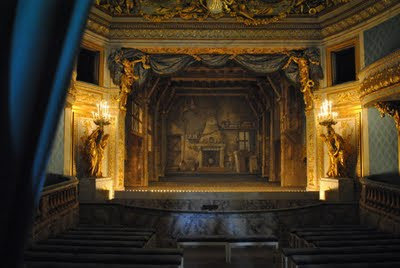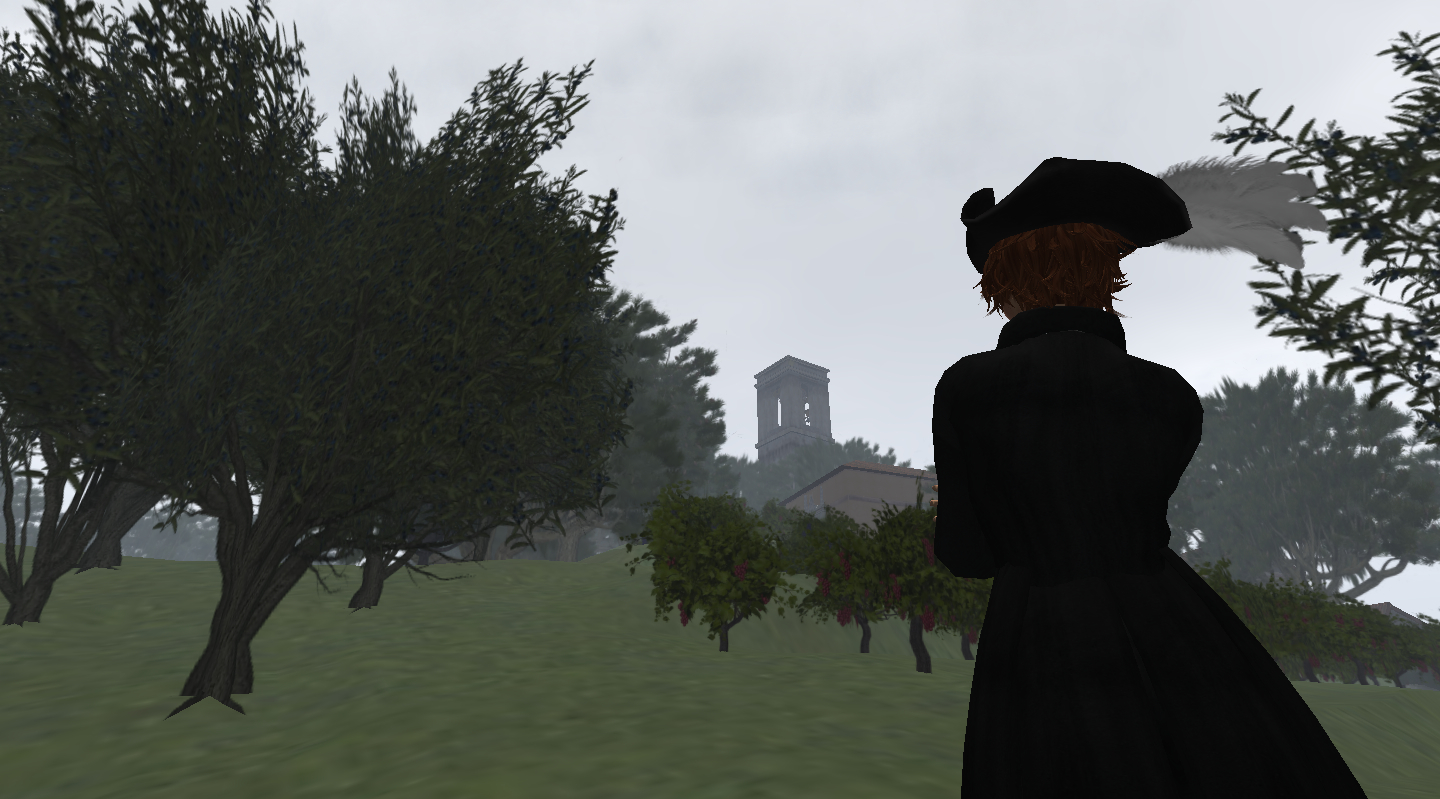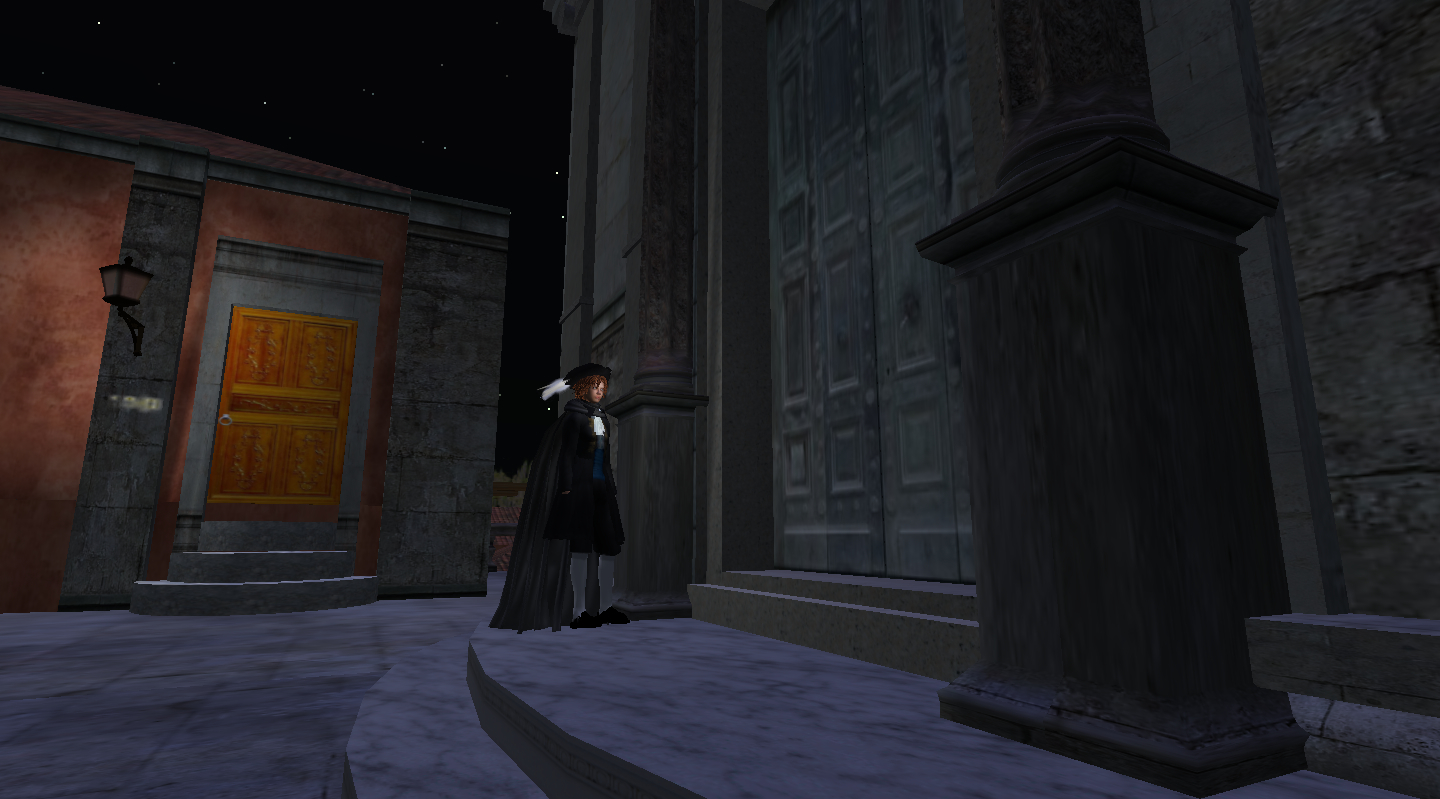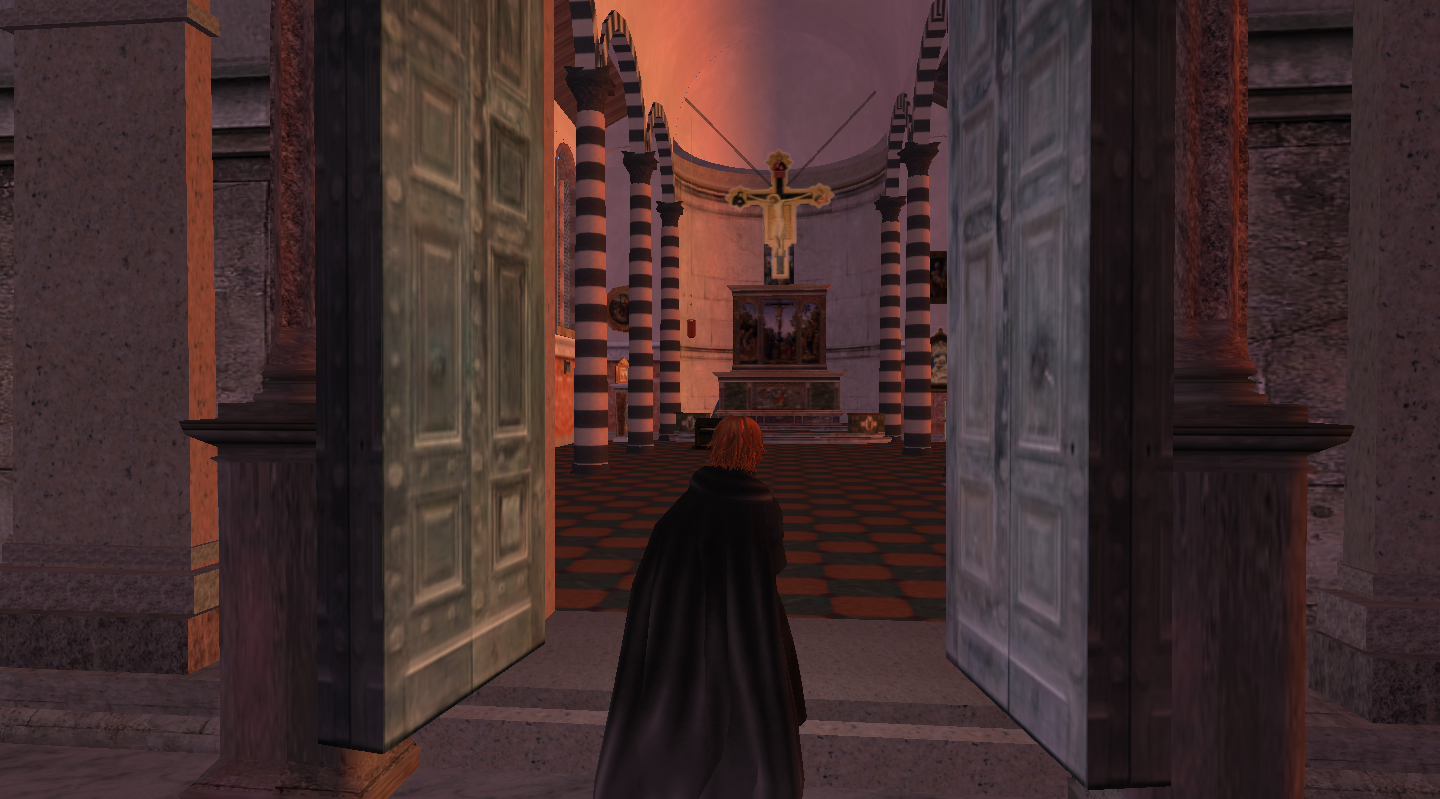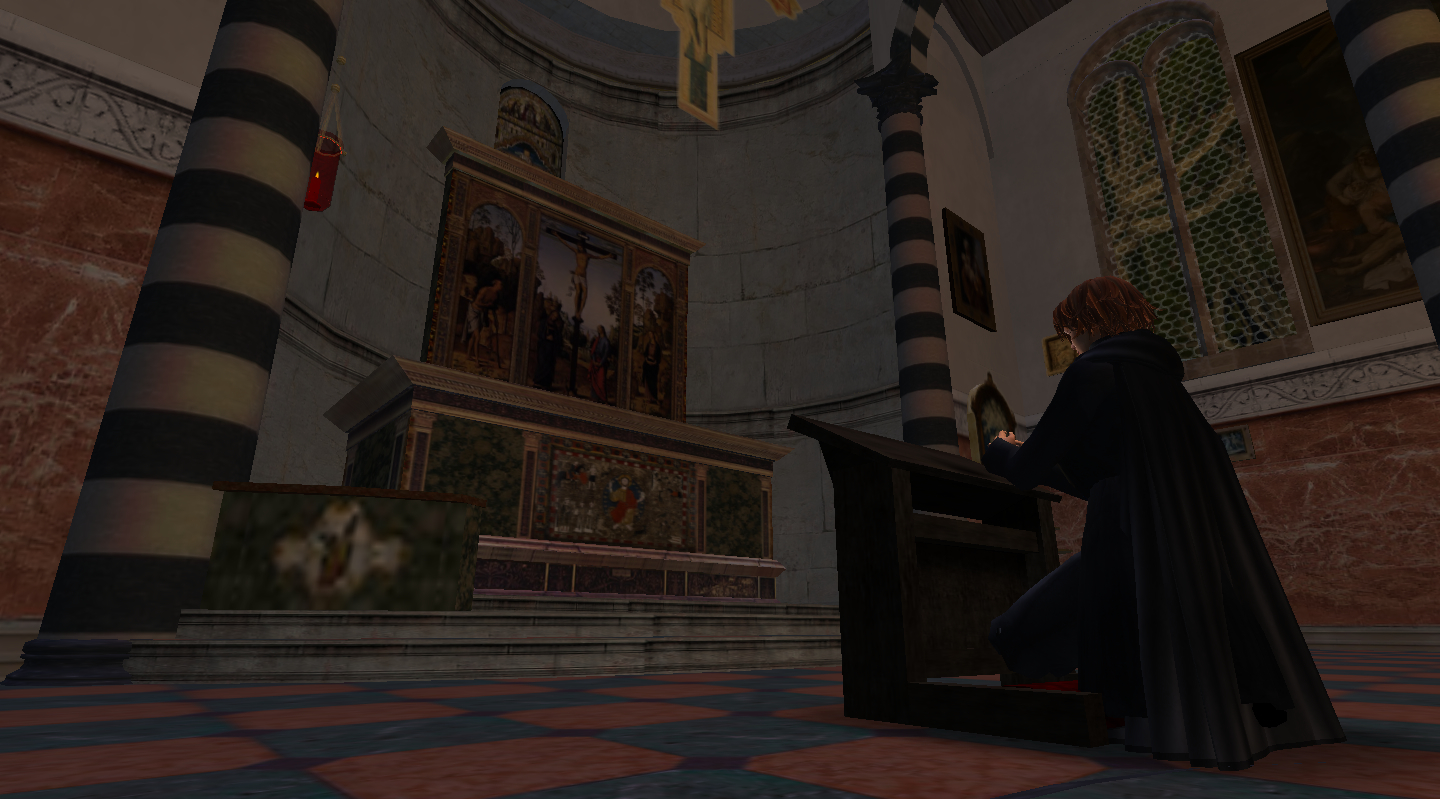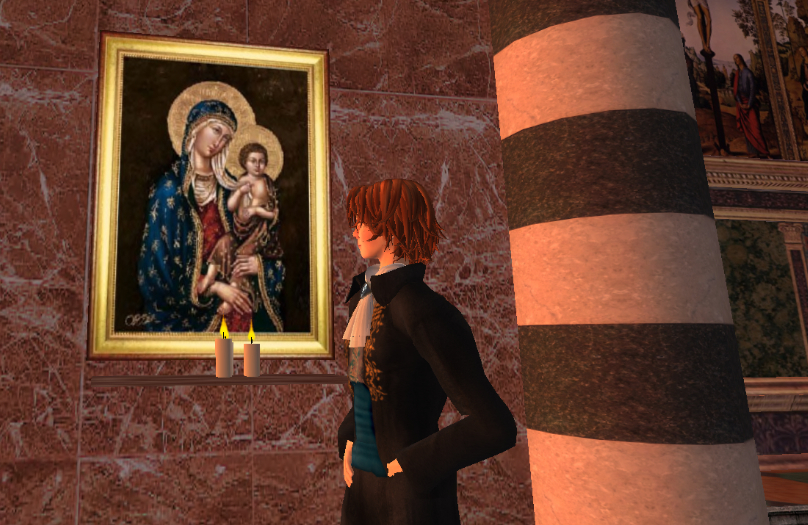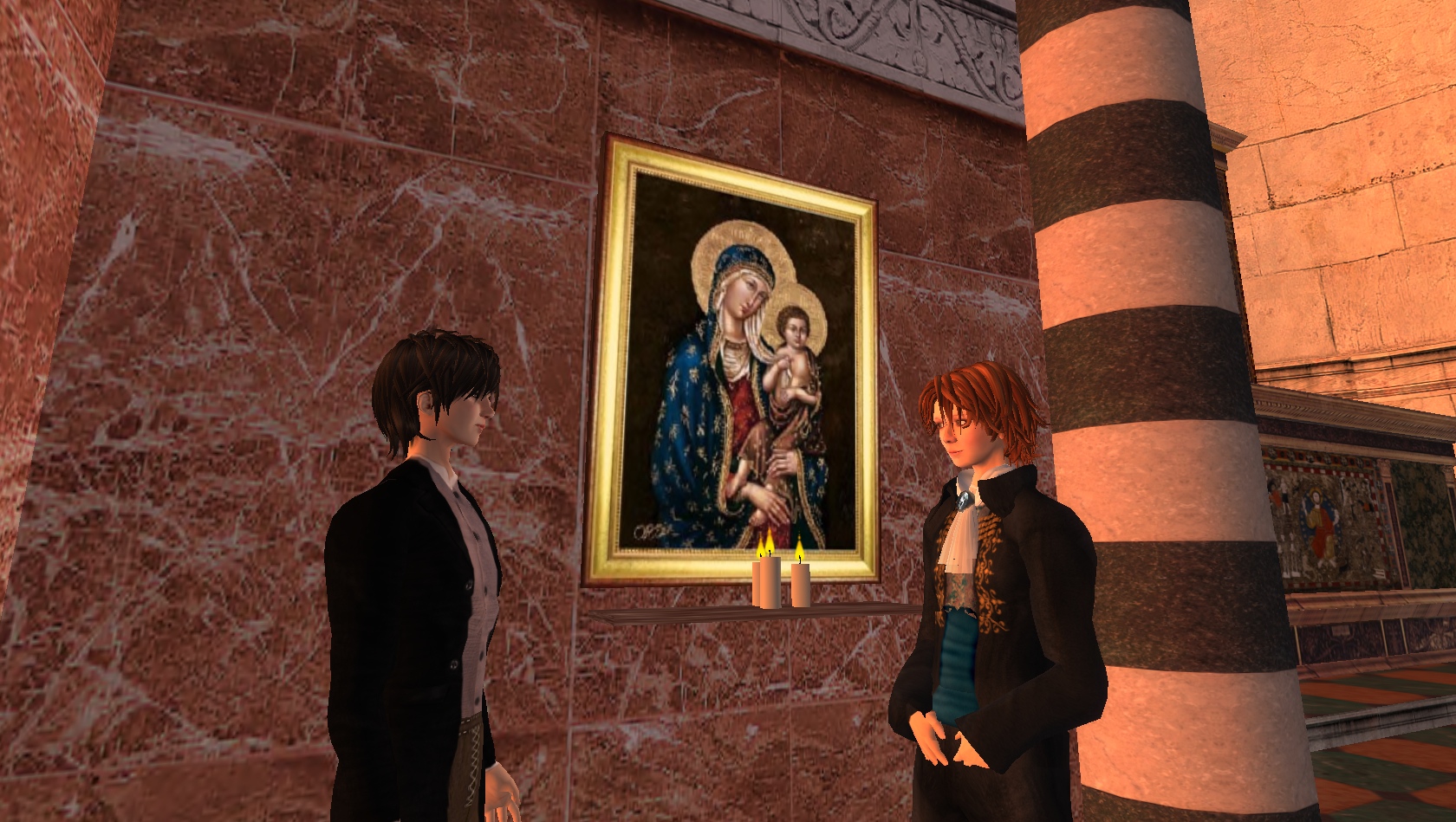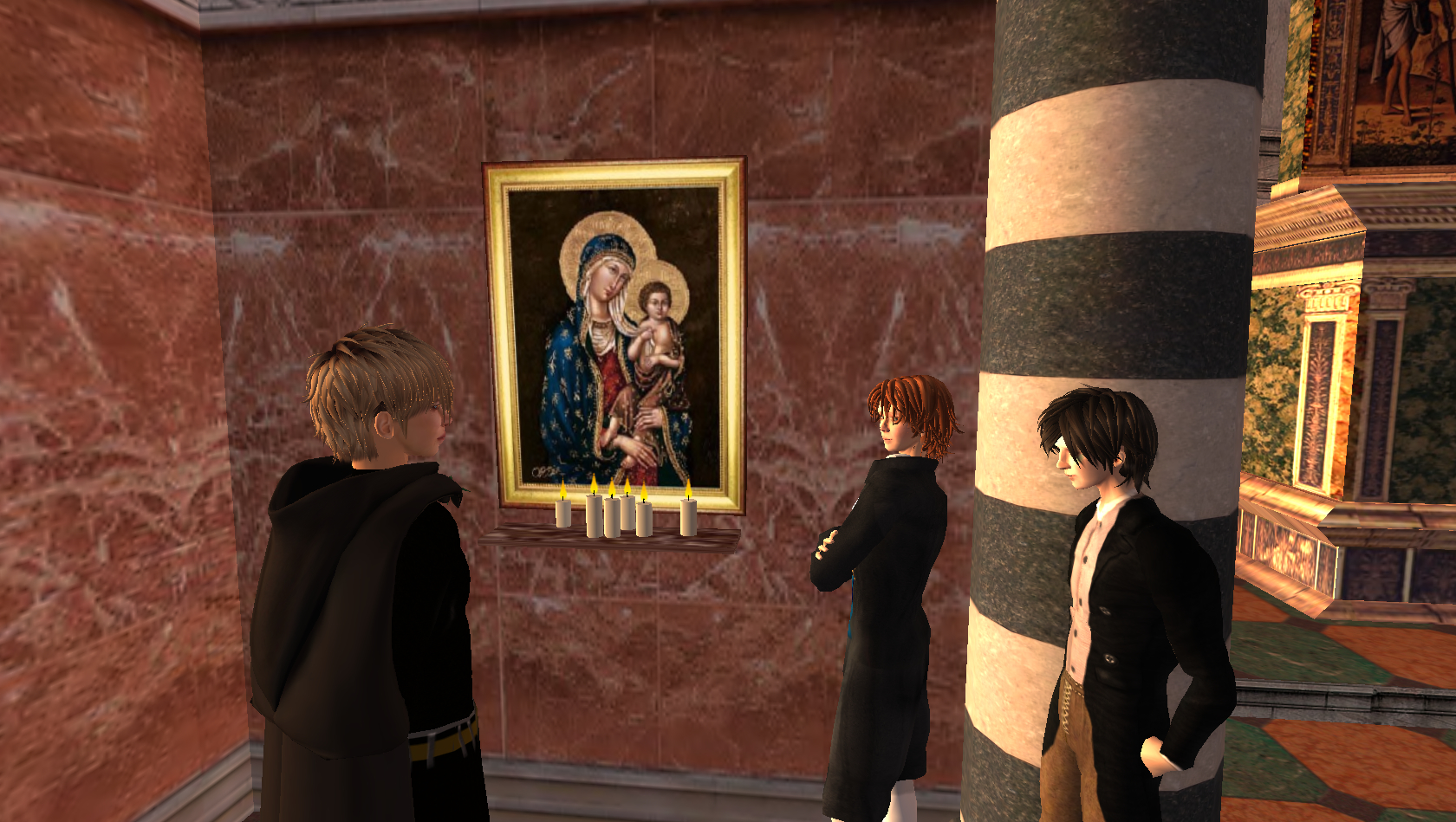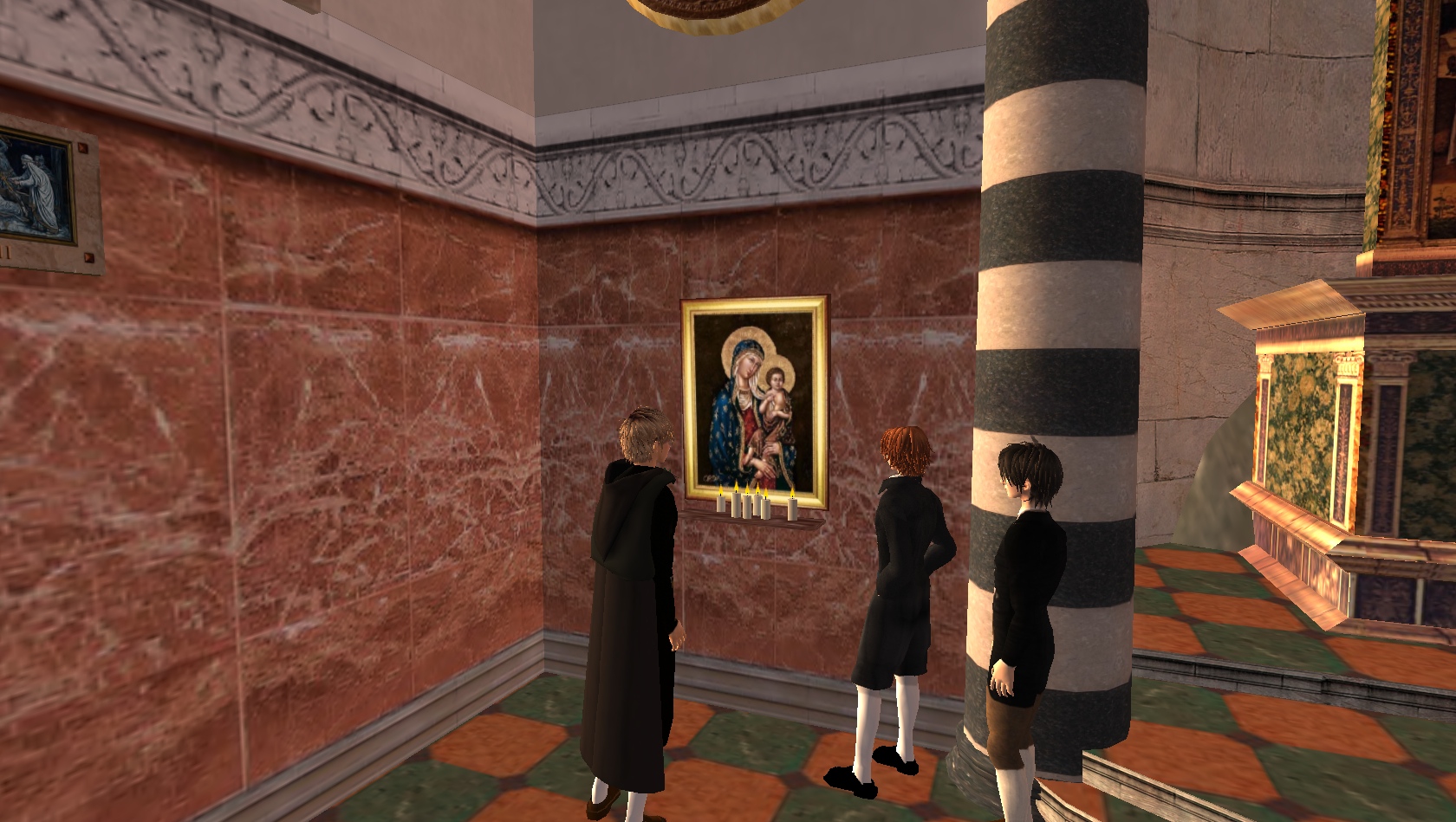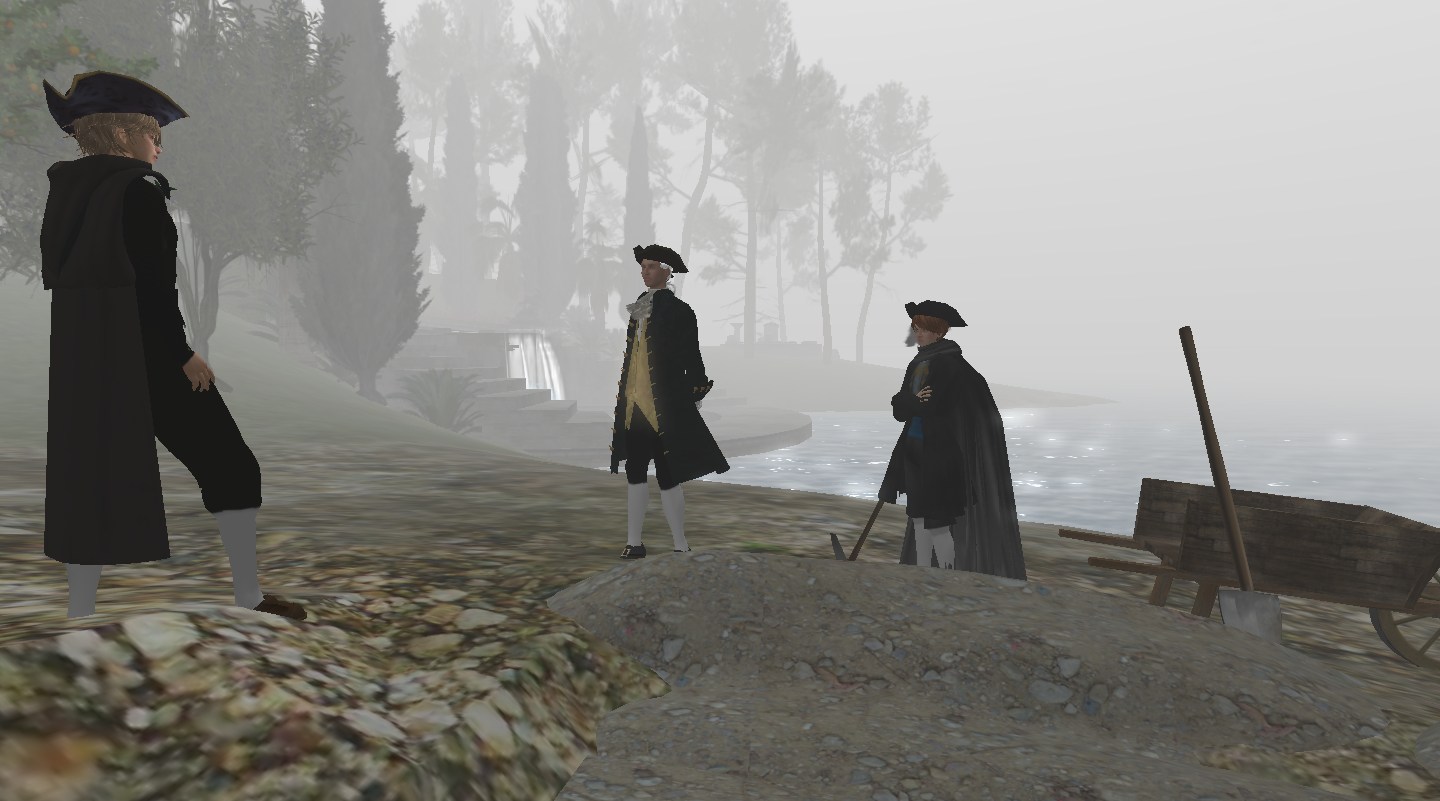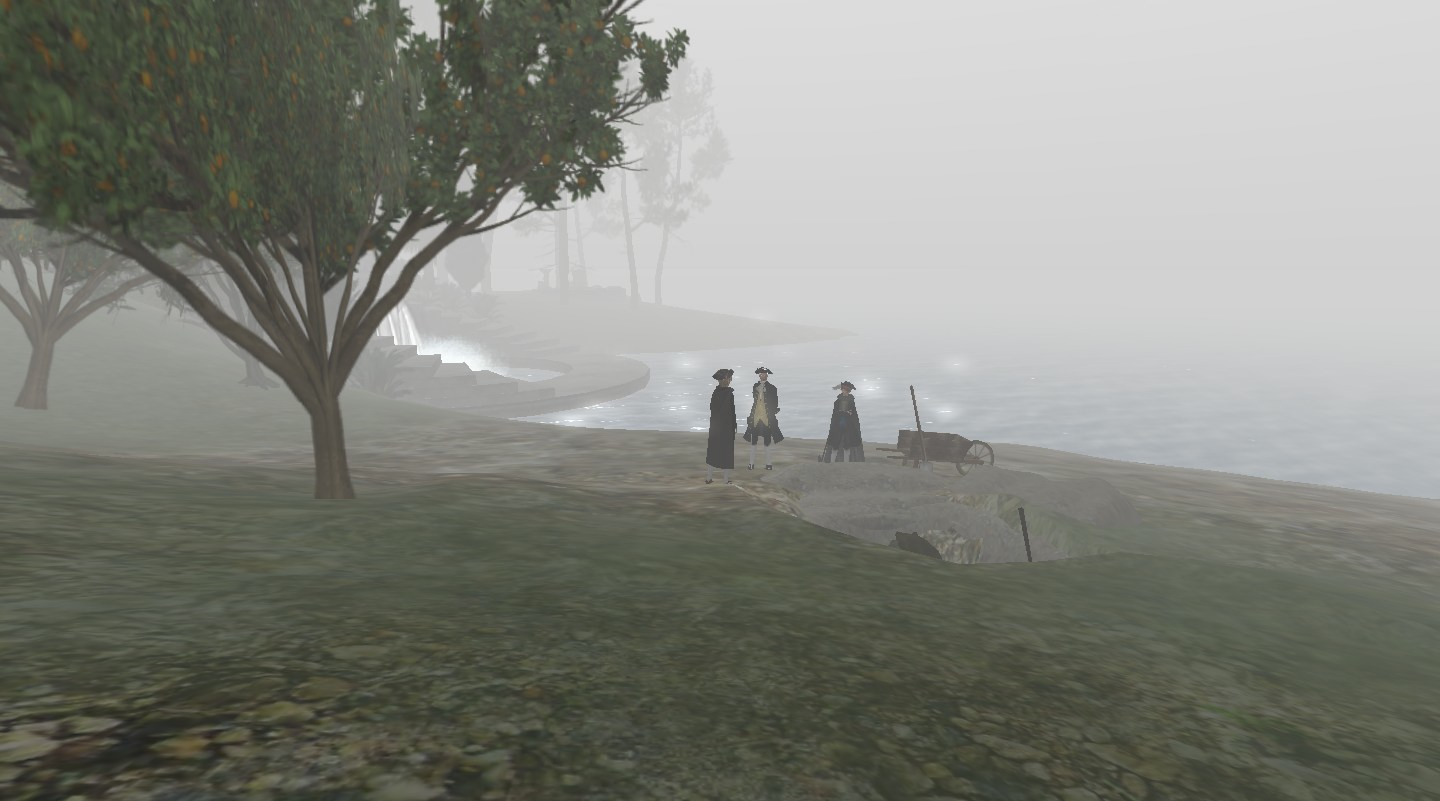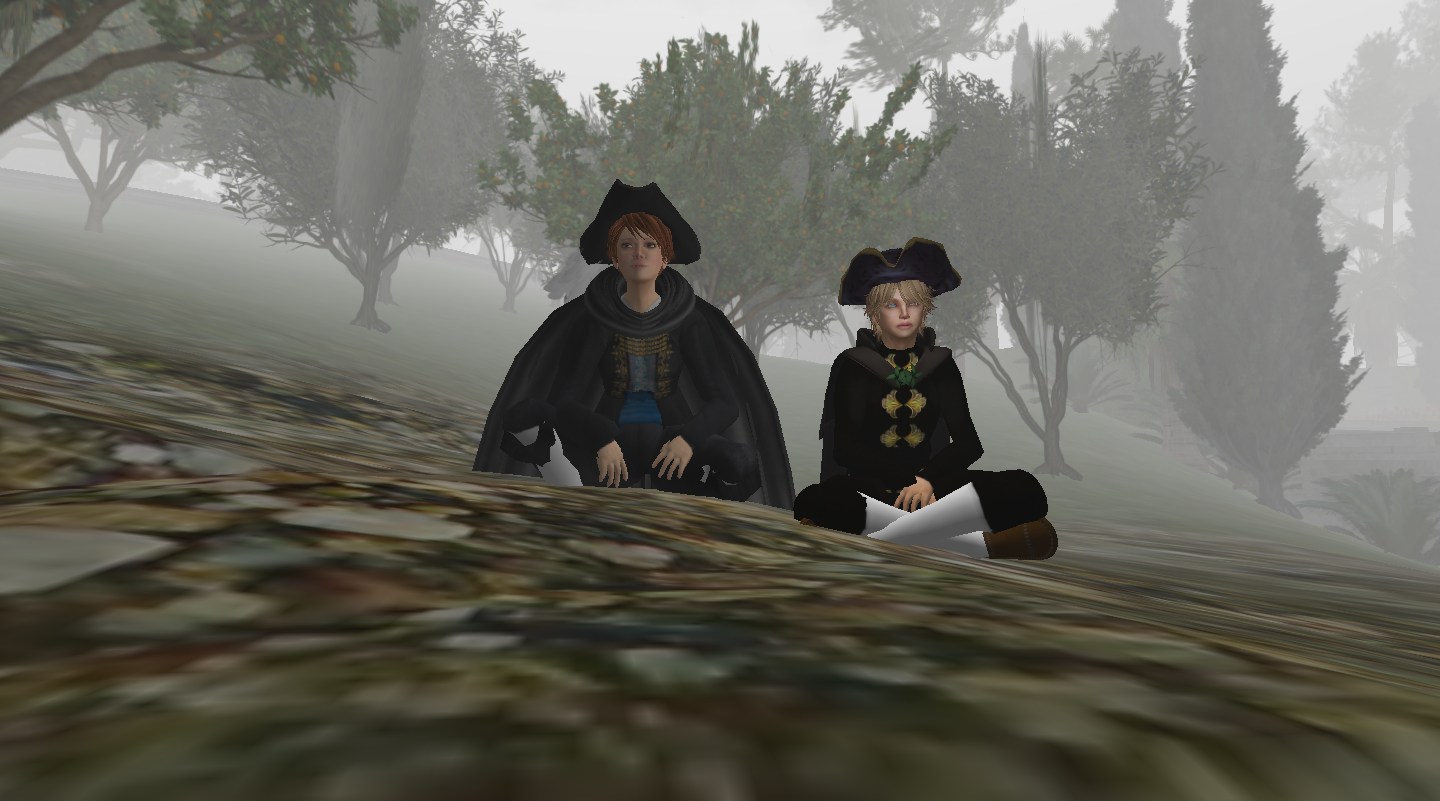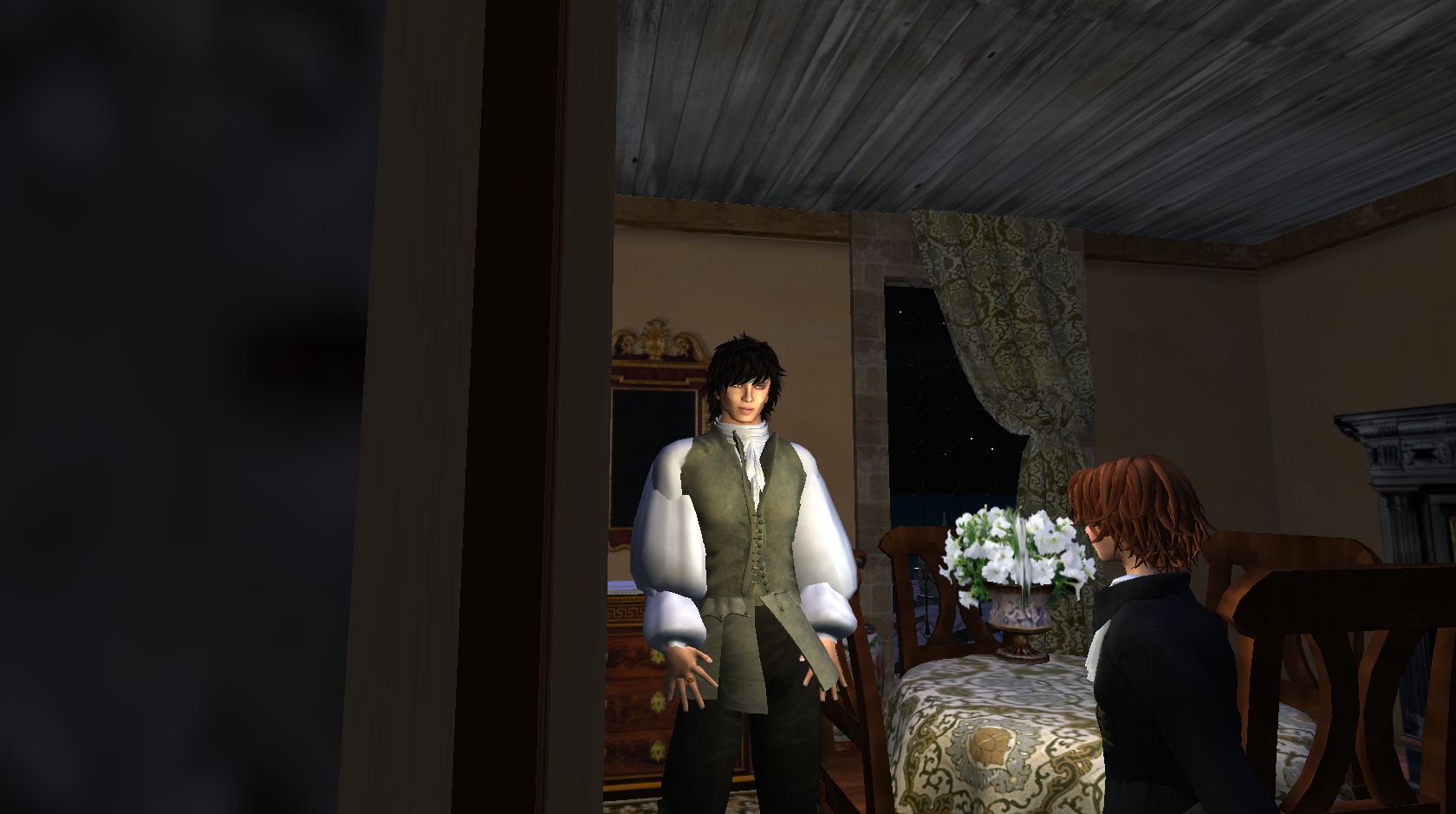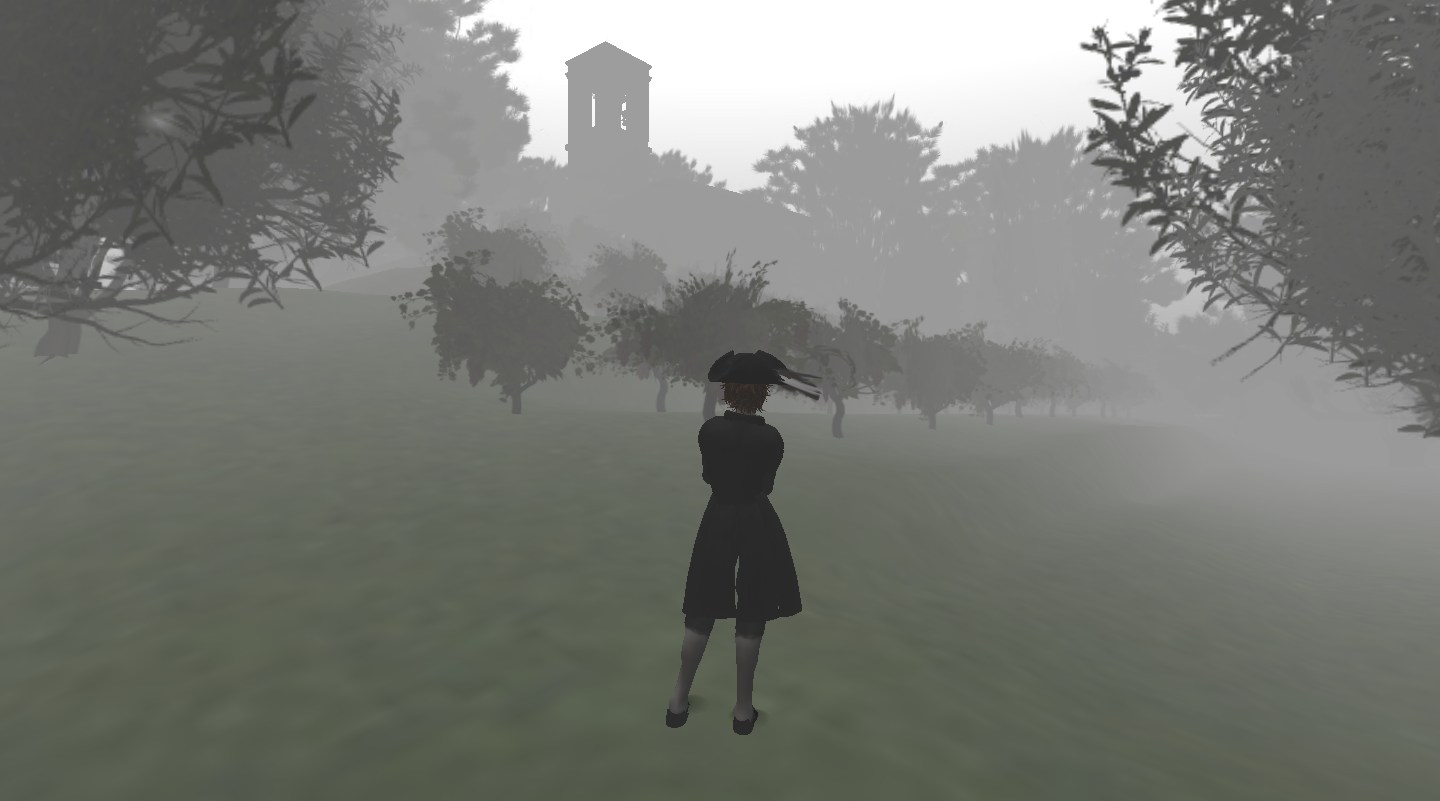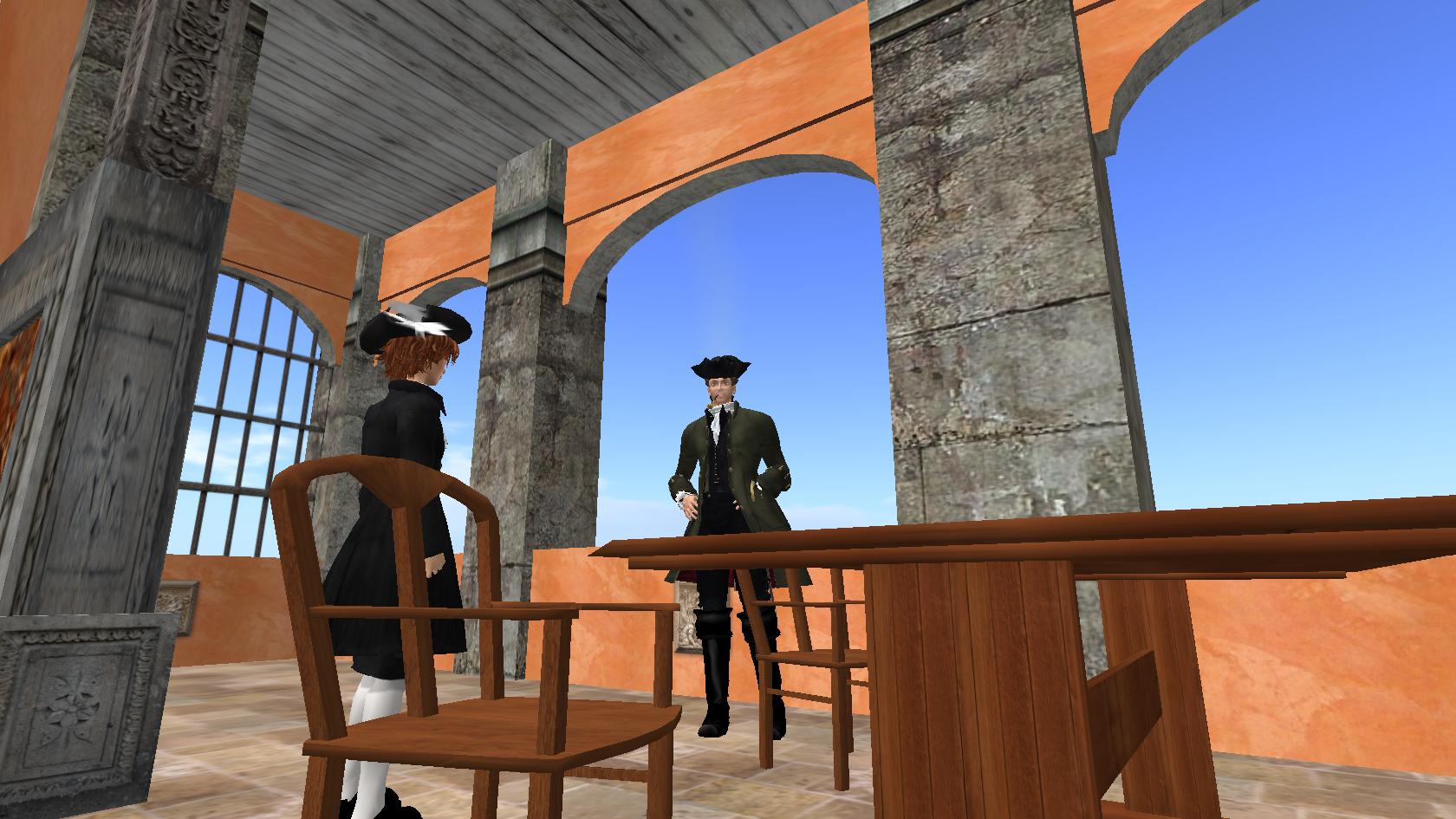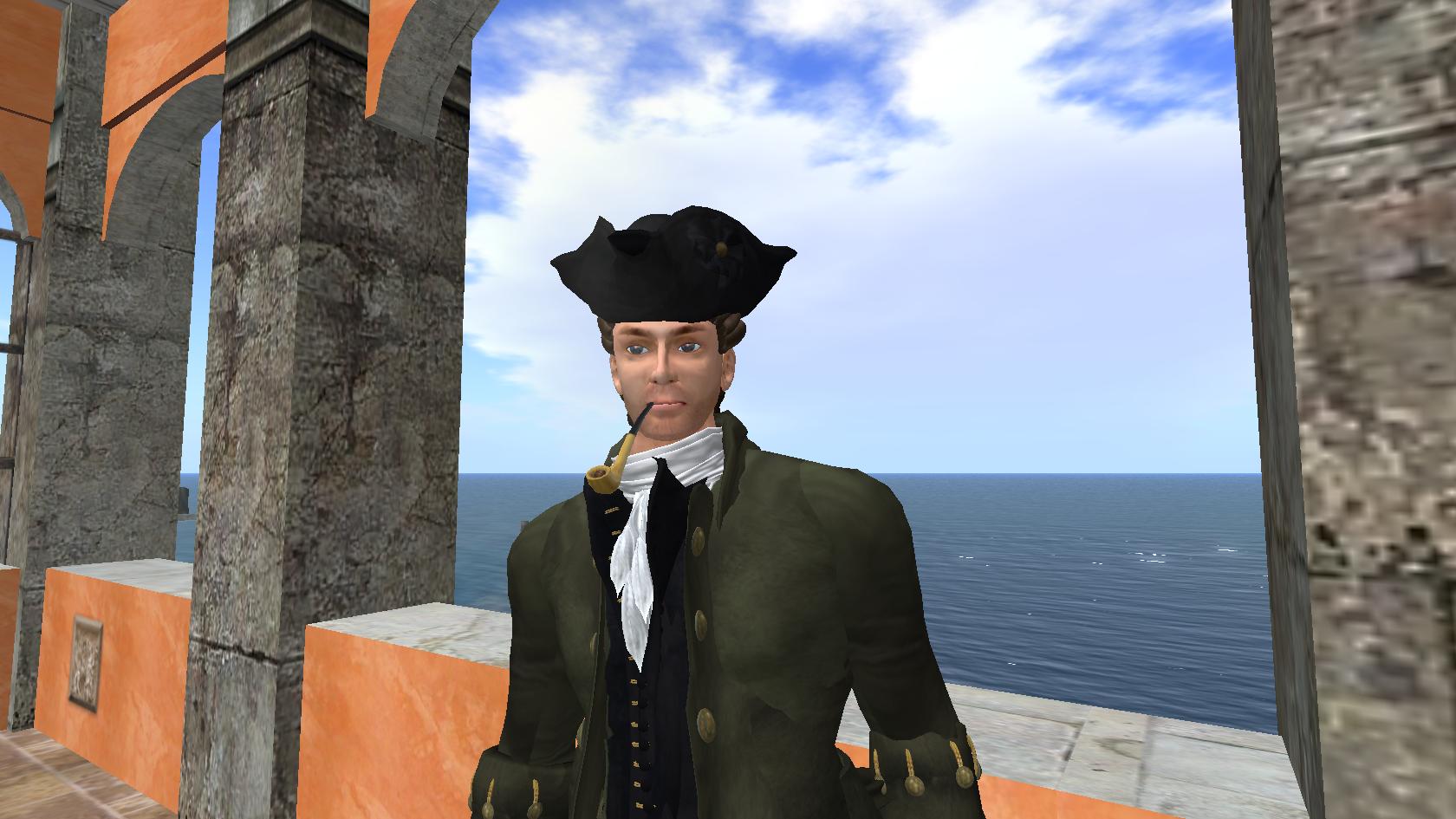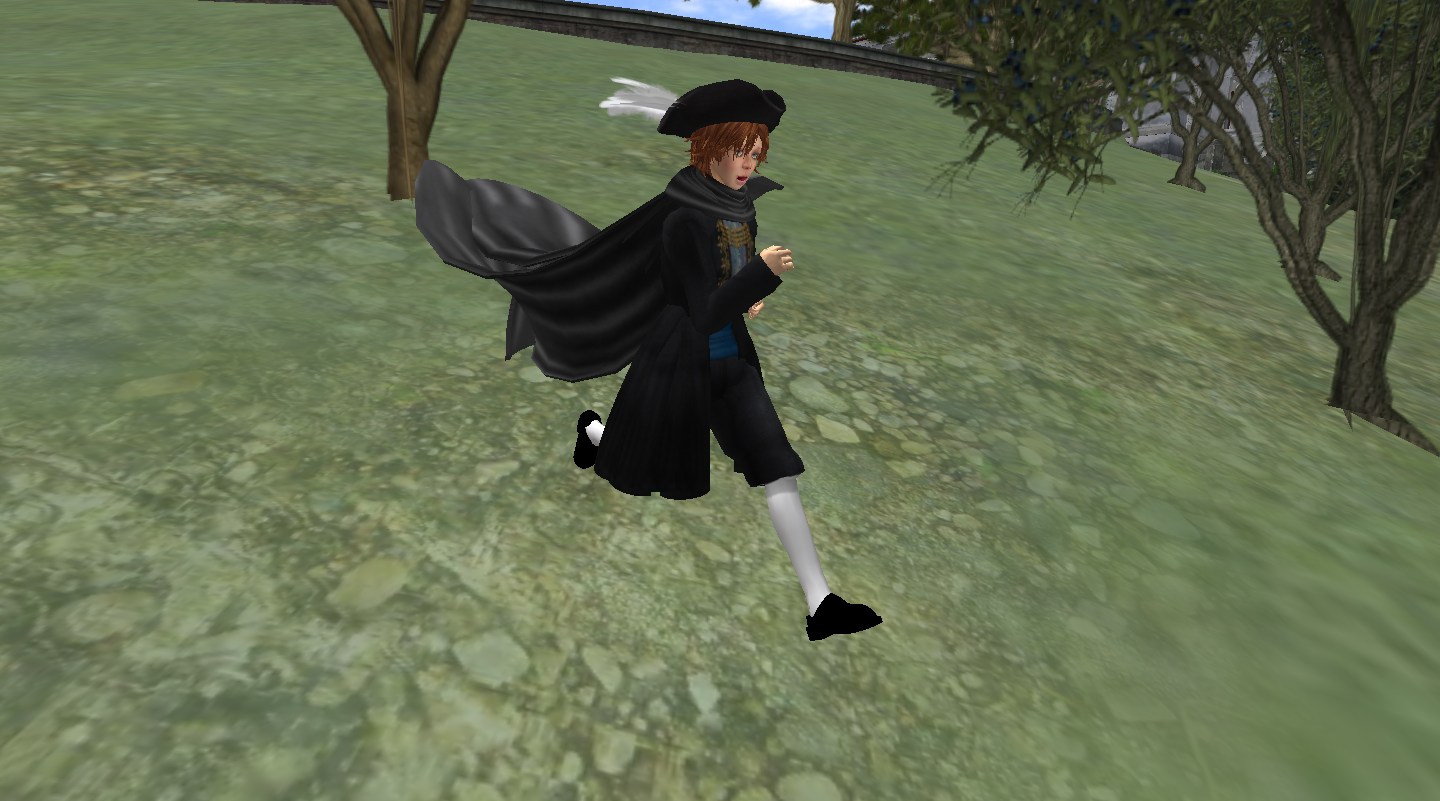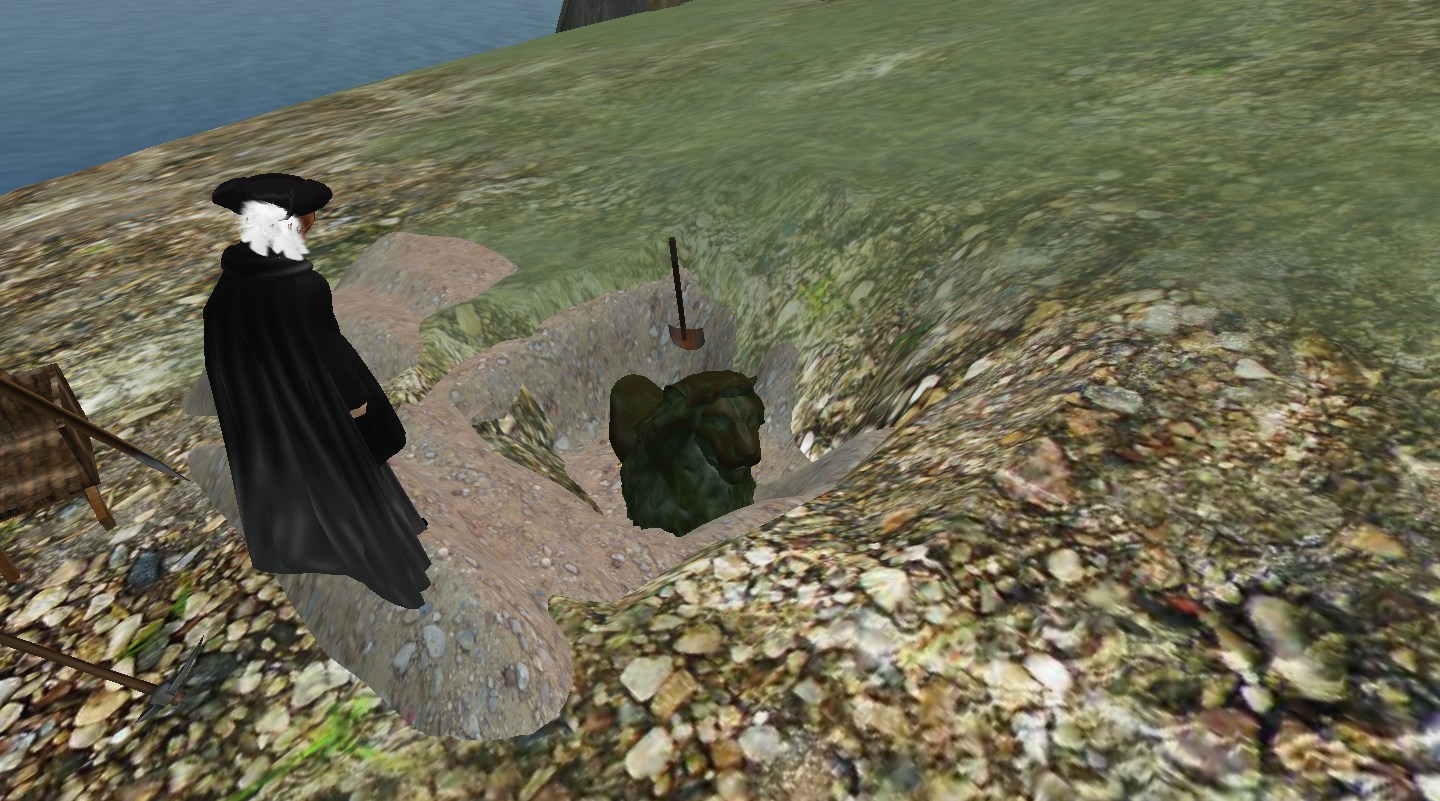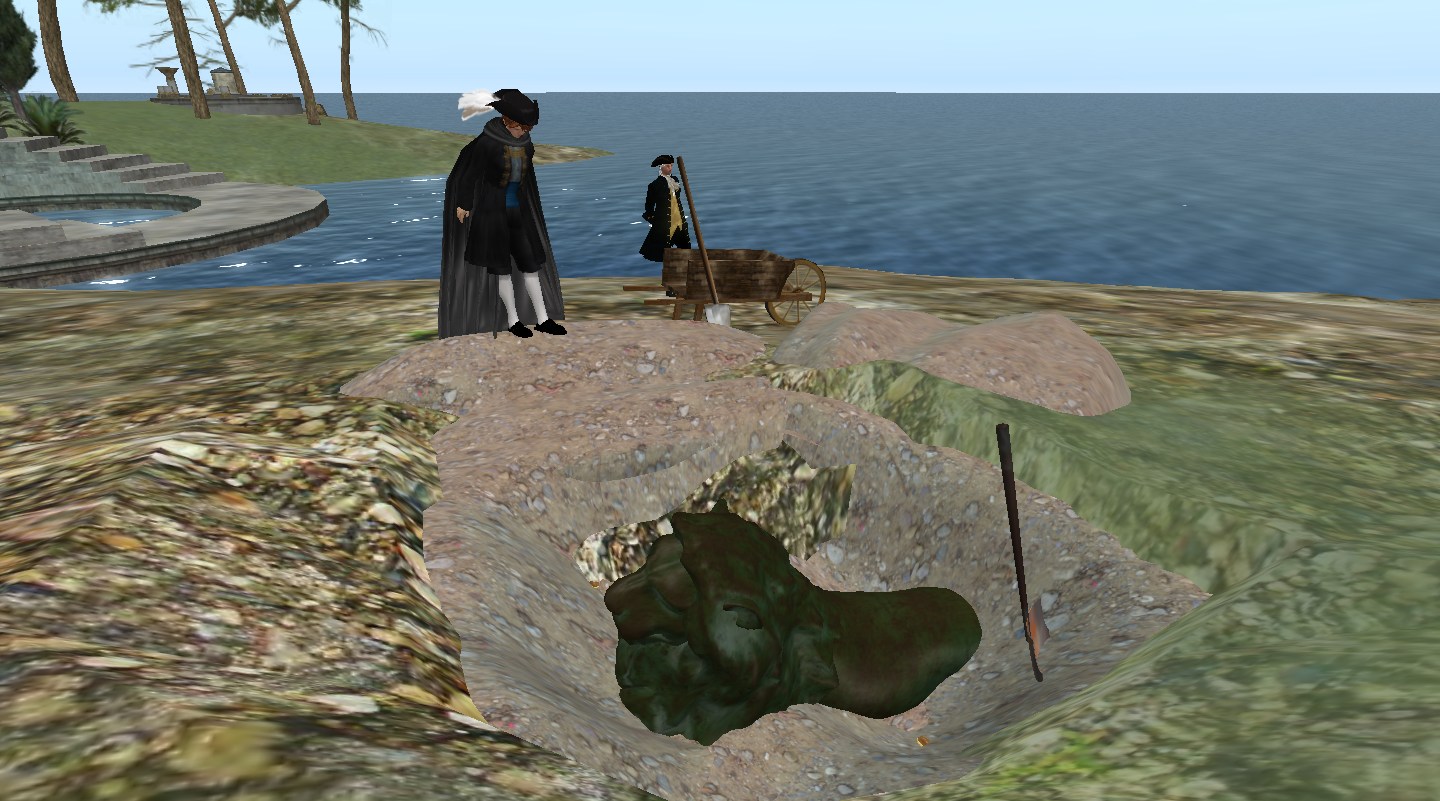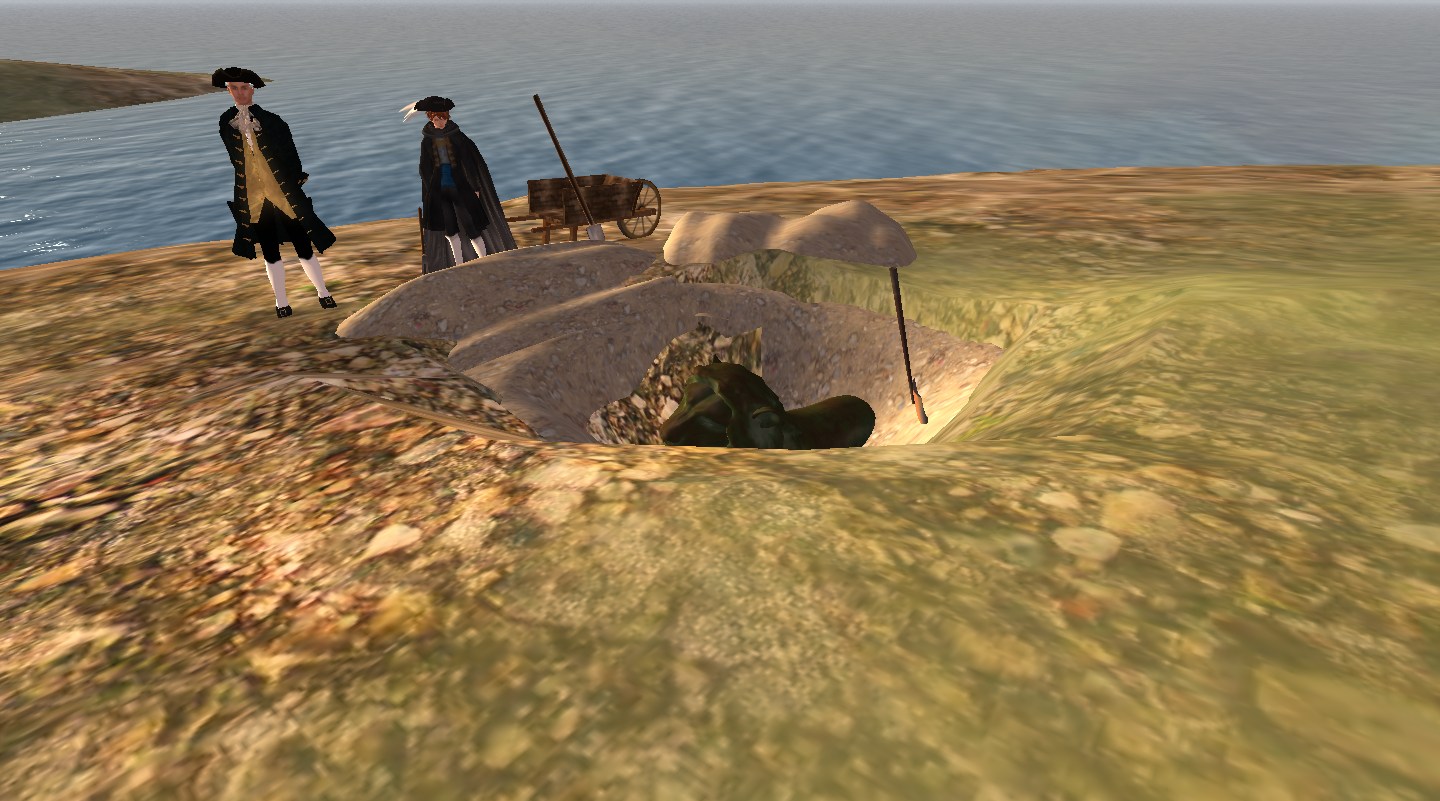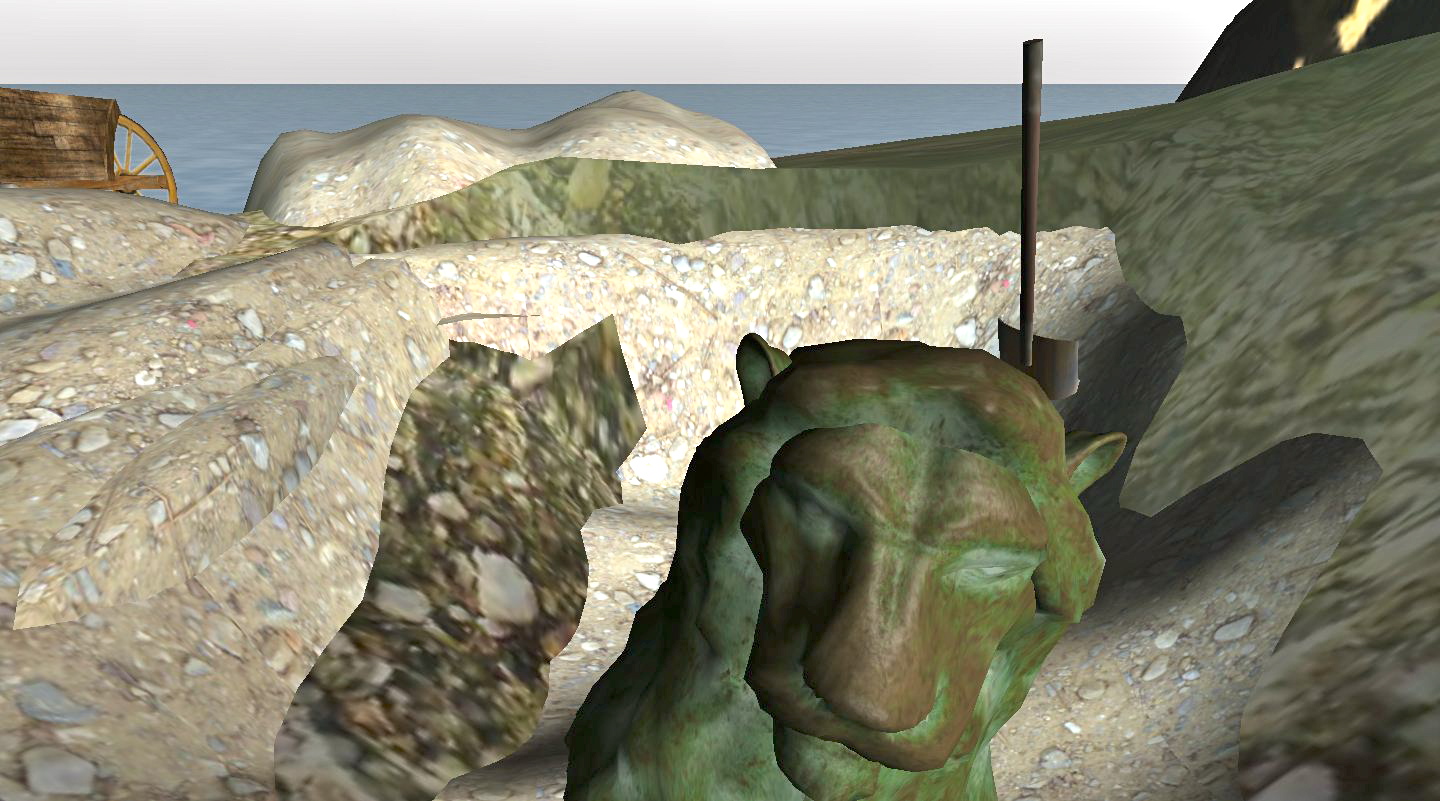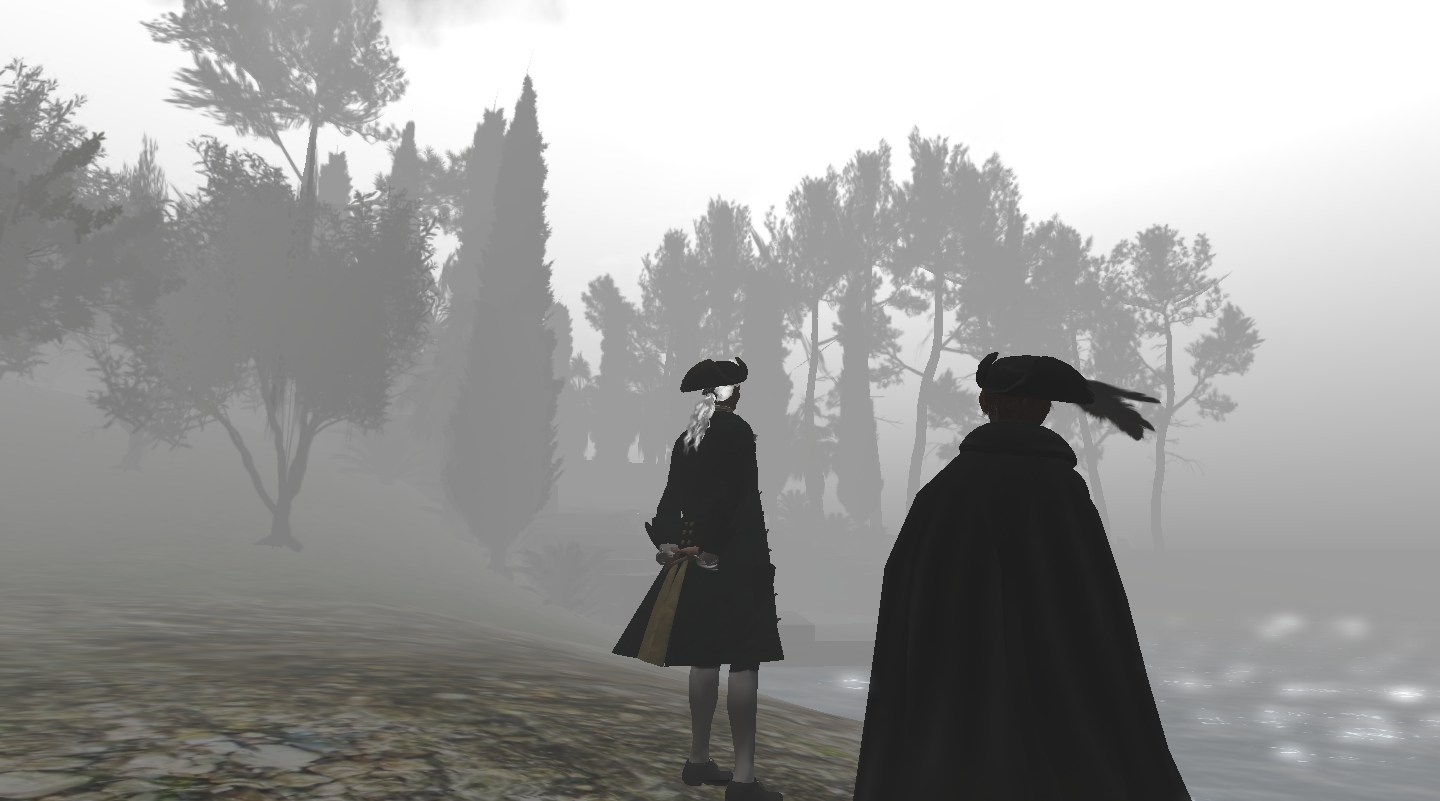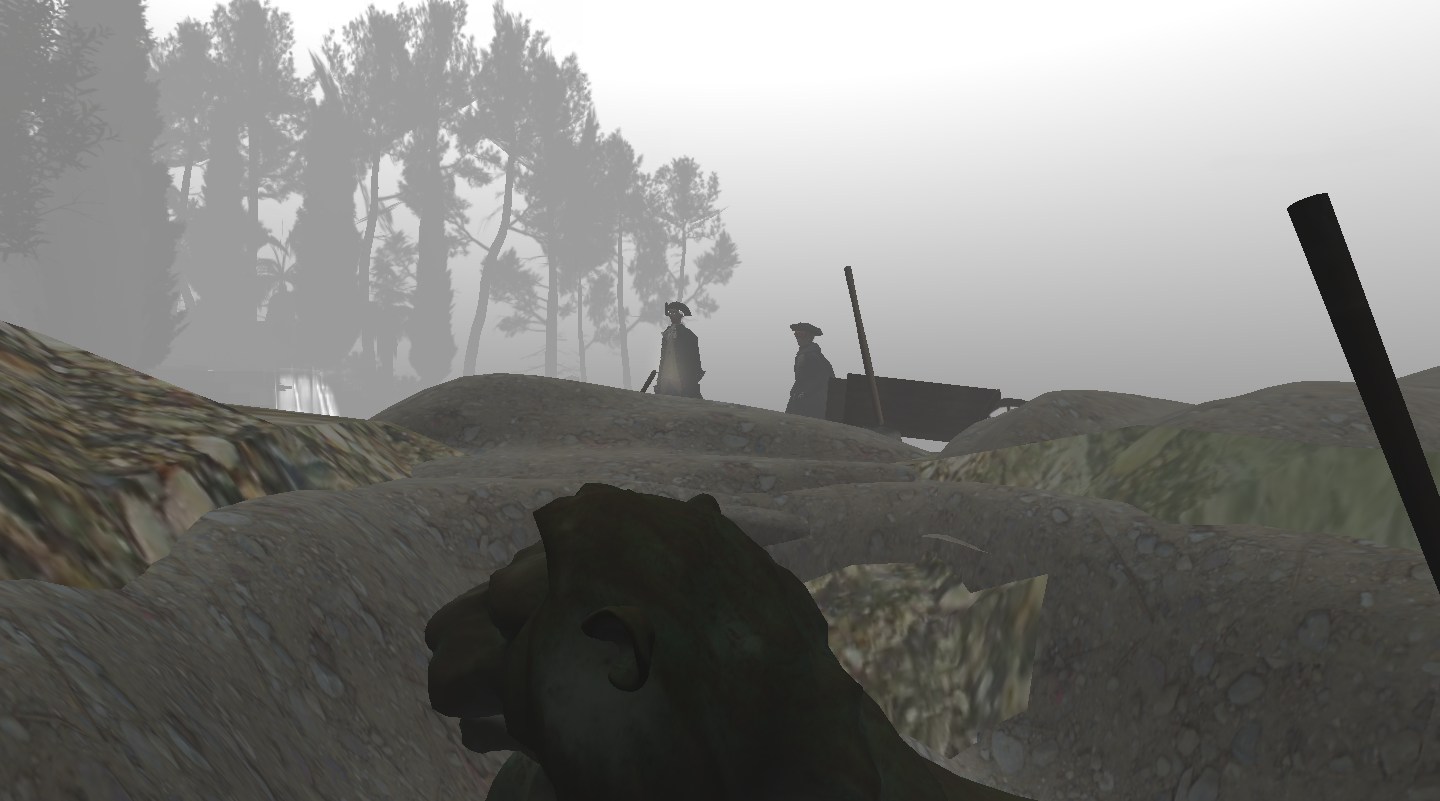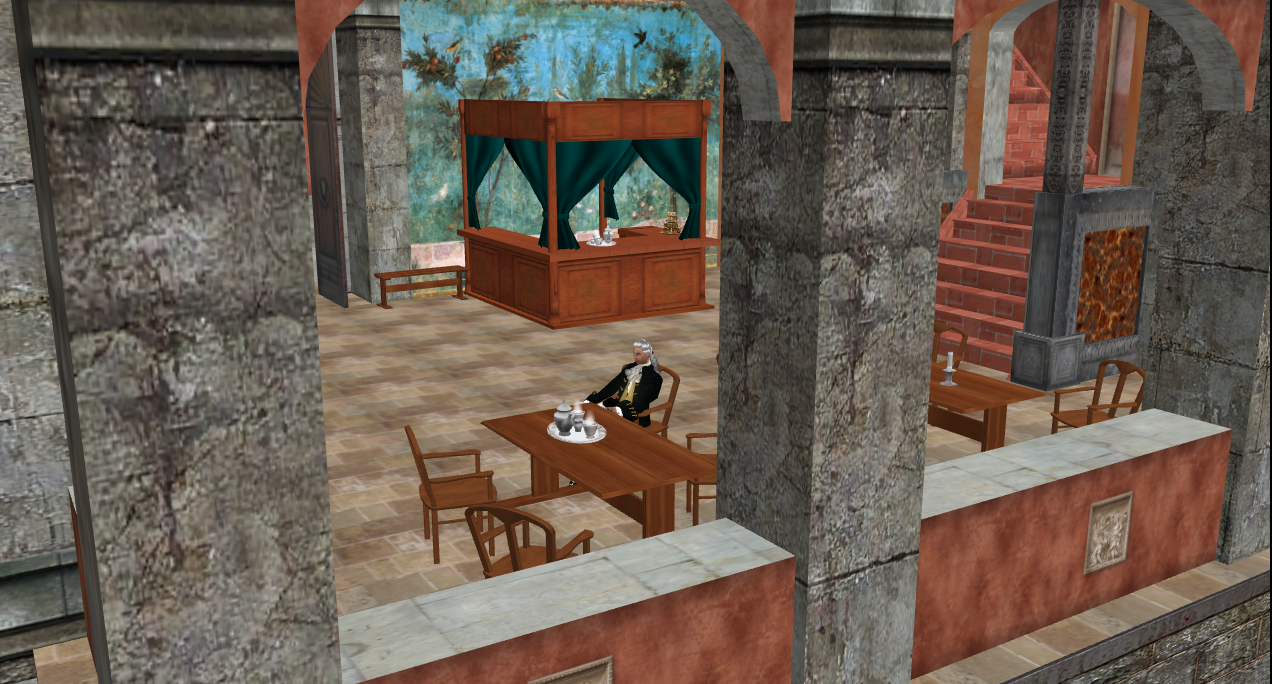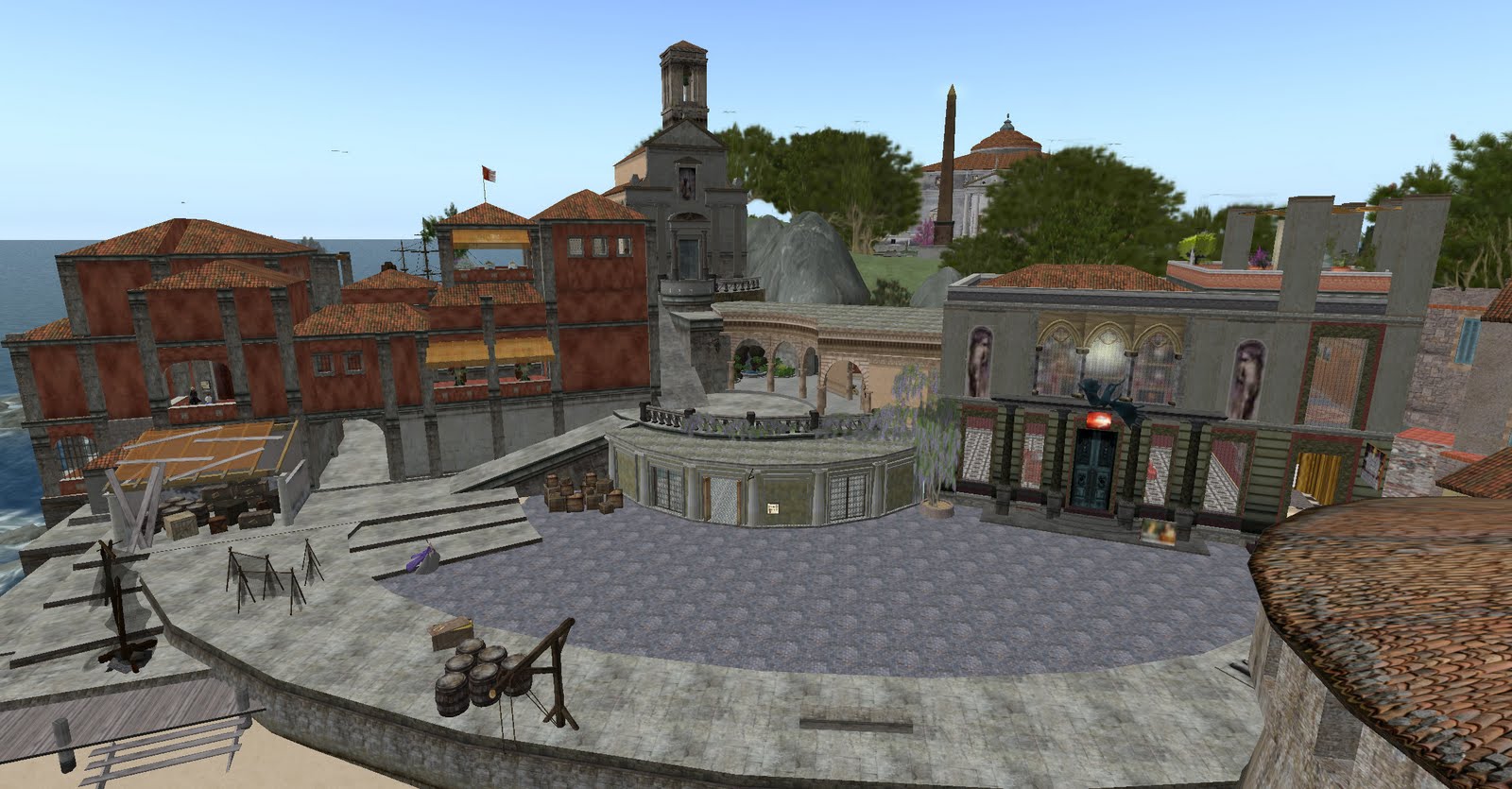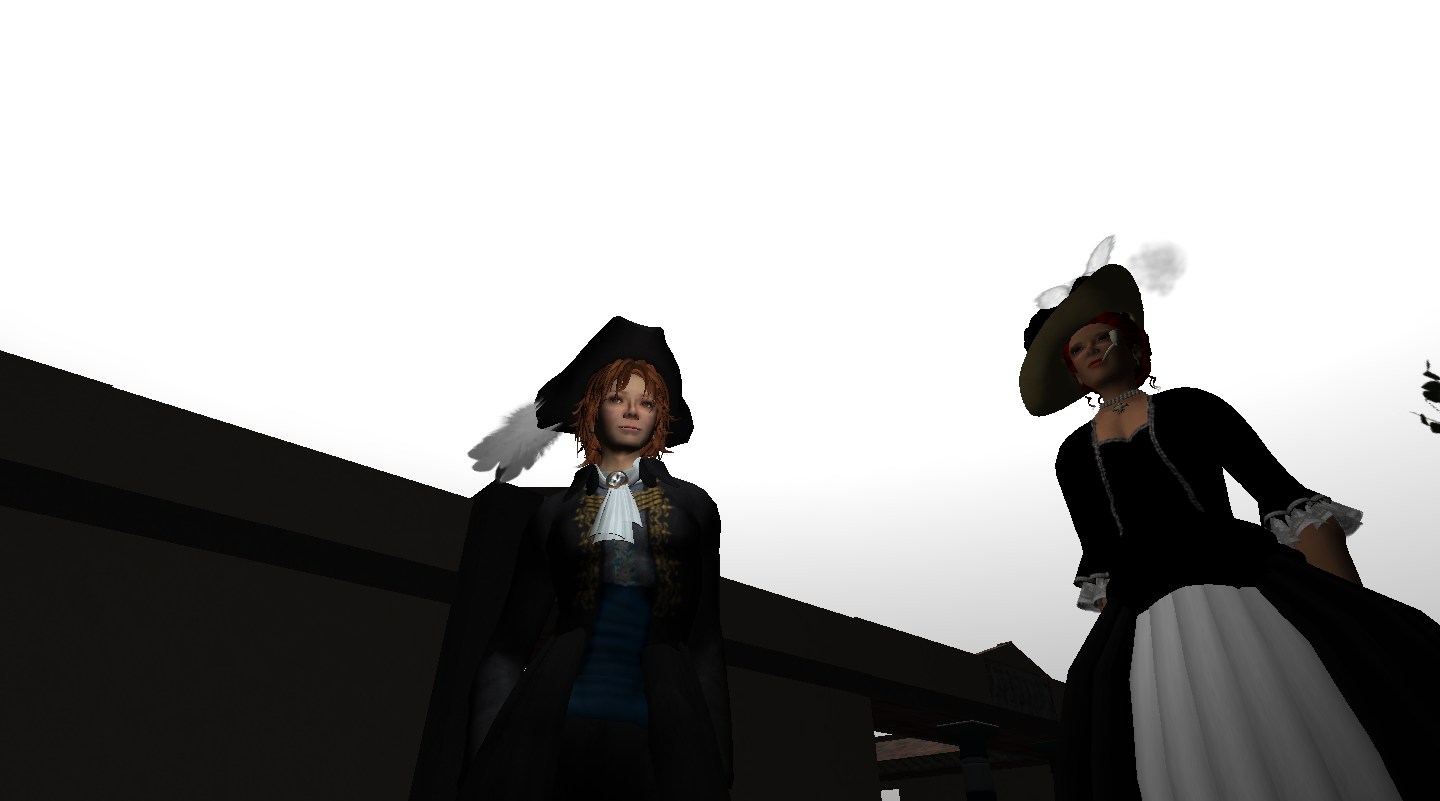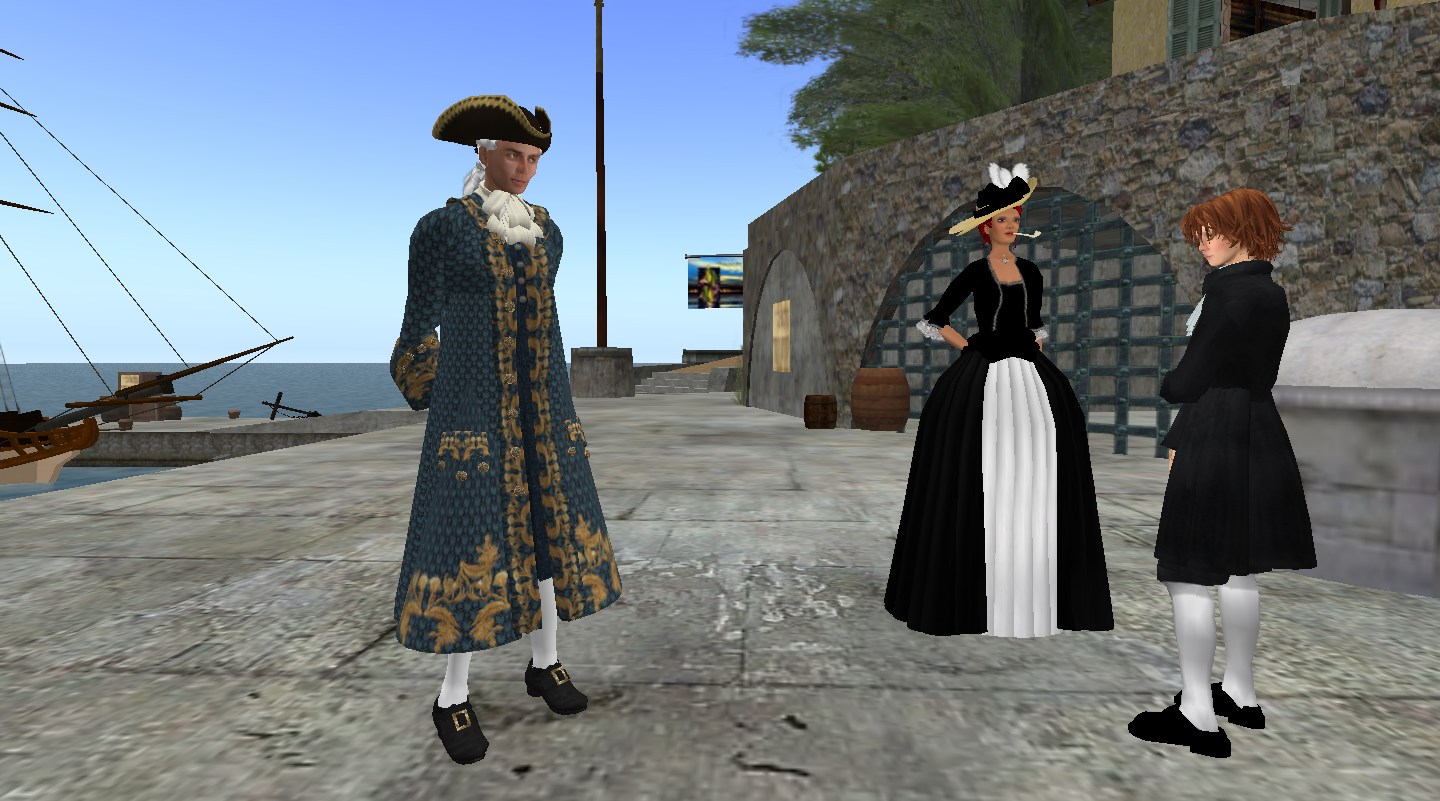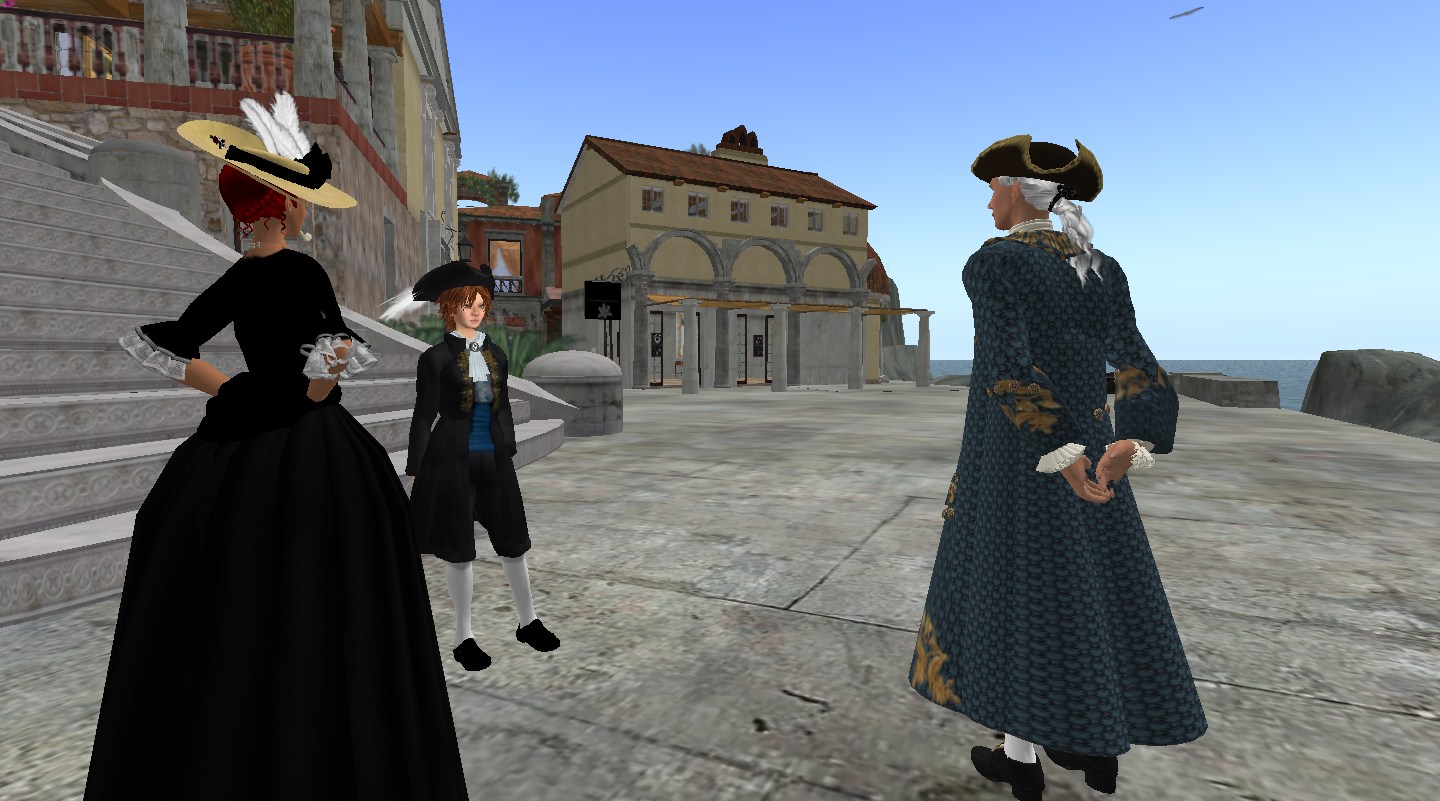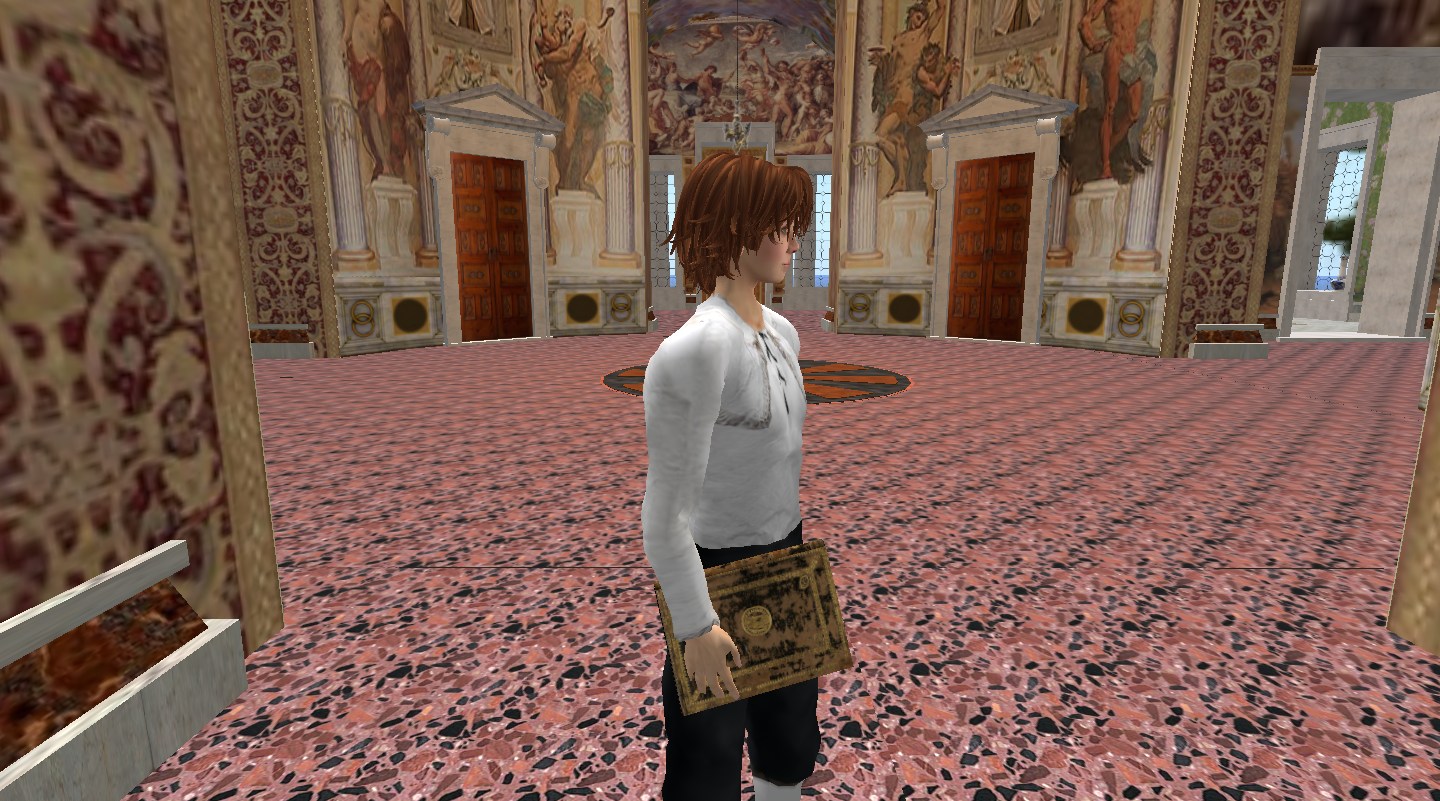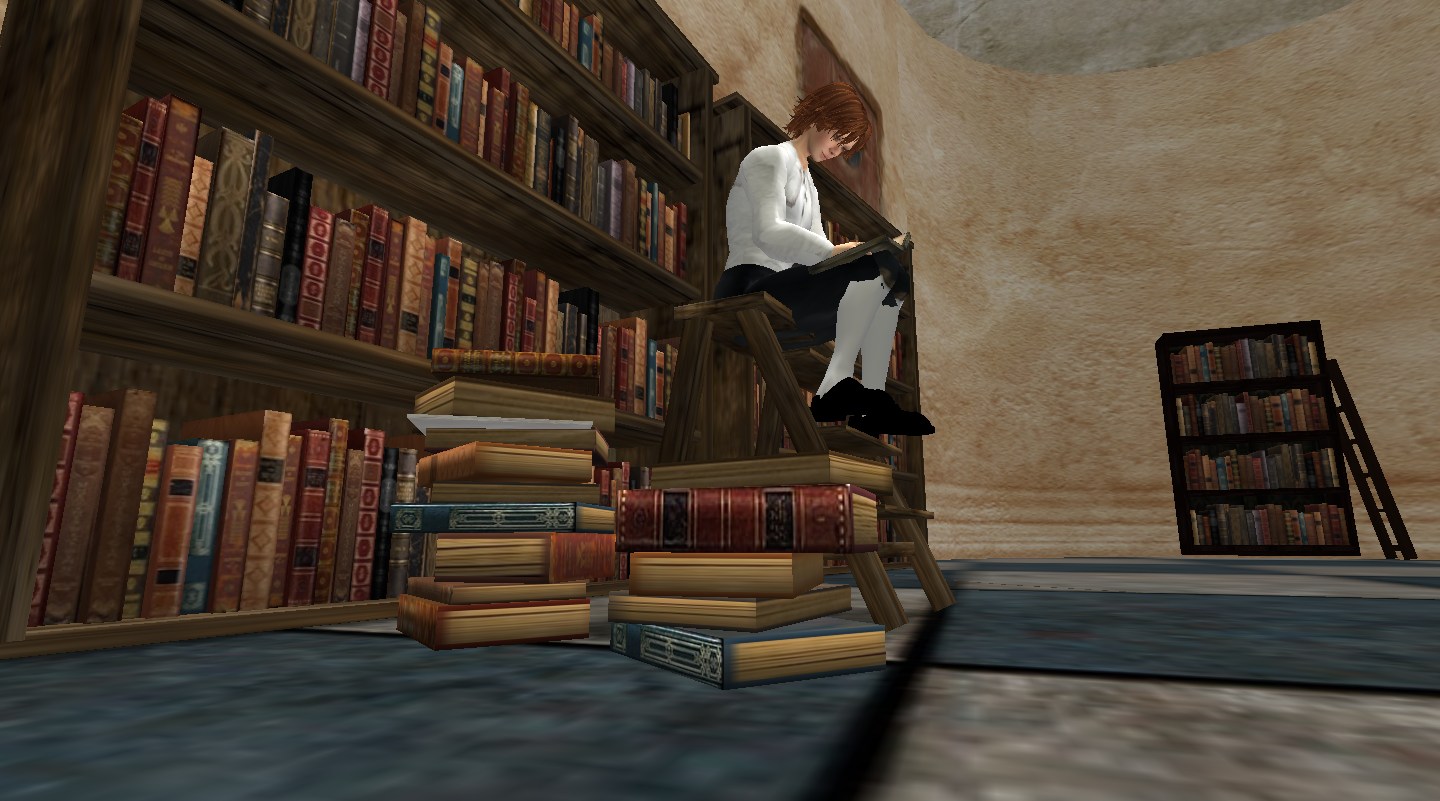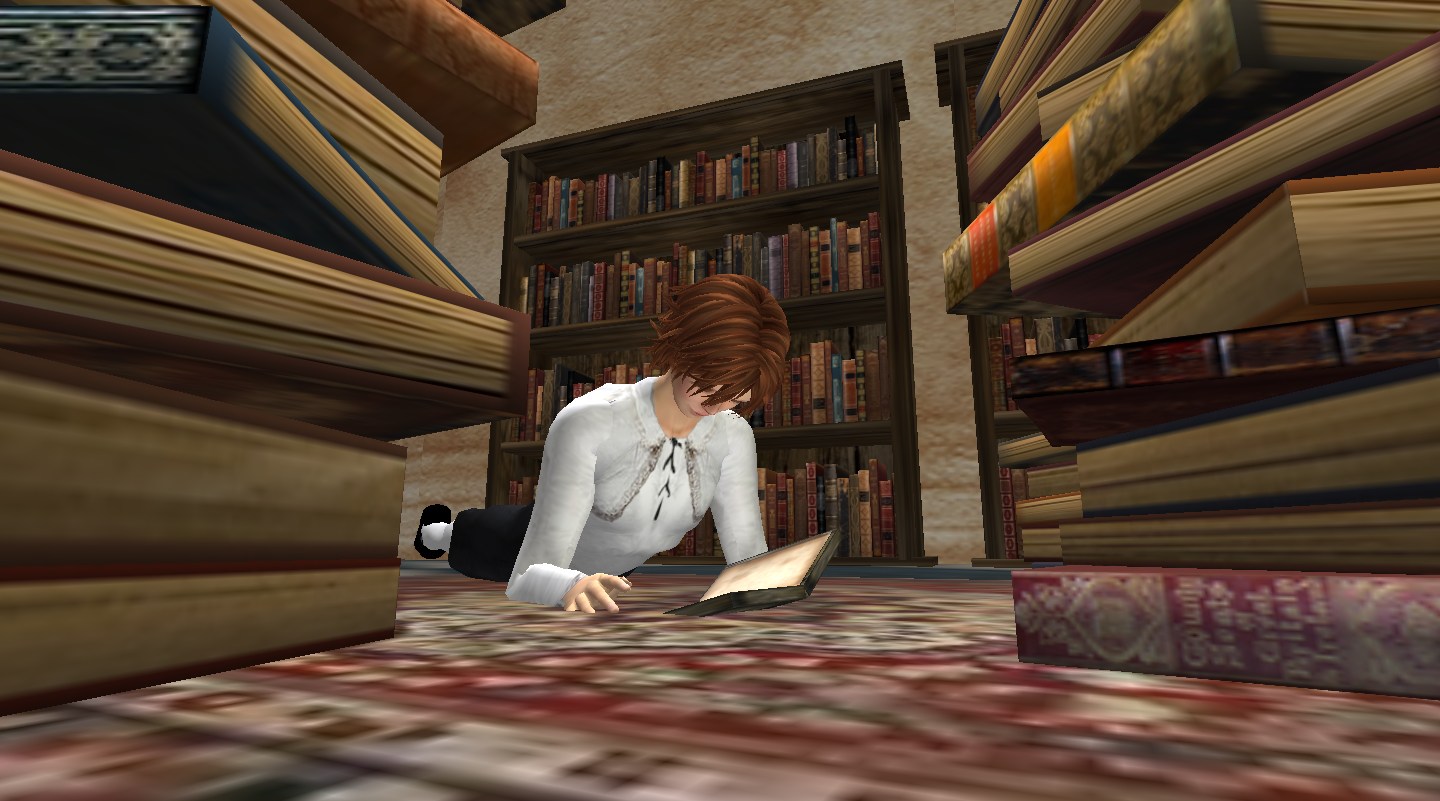Blogs
Continue readingon Tatiana's Tea Room - Petit Trianon: The Queen's Theatre .
For two days my head hurt from trying to overcome all the confusion that reigned since news had reached us that the Prince of Melioria had gone missing. Now the bells of the church of S. Maria degli Angeli tolled slowly and gently through the nighttime mist, reverberating in every muscle of my body. Without thinking or deliberating further, I made my way up the hillside to the door of the church and entered.
The little church was empty. Only the votive candles beneath the sacred images gave any light, but this was enough for me. I knew the building by heart, and moved forward without stumbling.
As I knelt to pray, images of people filled my mind: the missing prince of Melioria and so many others who had been torn away from me by wars and floods! I collected all their faces in my memory and placed them in the hands of the beloved Savior, asking God to take care of each of them and all of them.
A candle flickered in front of my favorite image of Our Lady, Maria Santissima. I stood and went in front of that image and lit two more candles: one for Prospero and one for Rico. Please, Most Holy Mother of Jesus and my Mother, take care of my friends and me as we make our journey, I whispered.
My throat began to ache and tears stung my eyes. So many friends had disappeared since the floods in Venezia. I could do nothing for them. My big worry now was for my friends Rico Millefiori and Prospero Pastorelli. Rico was collecting gold from strange visitors and hearing voices in the chirping of the blue birds. Prospero was sneaking off to Fortune Tellers. That all felt wrong. If I had not been trying to keep away from dubious sea-captains and the like, I might have been stronger for my friends. I had failed them. Now I feared they were losing their faith and their hearts too. Please, Madonna Santissima, dont let Rico and Prospero stray off the good path, I prayed.
Just then I heard a soft voice in my ear. Can you help me light this candle, Fiorino?
It was Rico!
Whoa, Rico, you startled me! I exclaimed.
I come to ask Maria Santissima to help us during our journey, he said, and placed the unlit candle next to the others. I ask her to keep us safe and keep us from the hands of evil people.
I lit his candle and placed it with the others. Before I could turn around, I heard another voice saying: Fantastic, Fiorino! Please light my candles too.
It was Prospero!
Oh, how glad I am to see you here, Prospero, I said, and placed his candles on the little shelf in front of the image of the Holy Mother and Child. What a good surprise!
Certainly, carissimo, what do you think? We need many blessings for our safe return home, he said.
Ah, Prospero, amico mio, I am so happy to hear you speak of blessings instead of fortunes on this night before we leave, I grinned. I am very happy.
Rico laughed, then he helped me to light the new candles that Prospero brought. When we had finished, we stepped back, and Rico led us in the song:
Salve Regina, Mater misericordi. Vita, dulcedo, et spes nostra, salve! *
[ To be continued ]
*Rico intones the traditional hymn that concludes night prayer, the Salve Regina, or Hail Holy Queen. This hymn to the Mother of Mercy centers around this petition: Pray for us, o Holy Mother of God, that we may be made worthy of the promises of Christ.
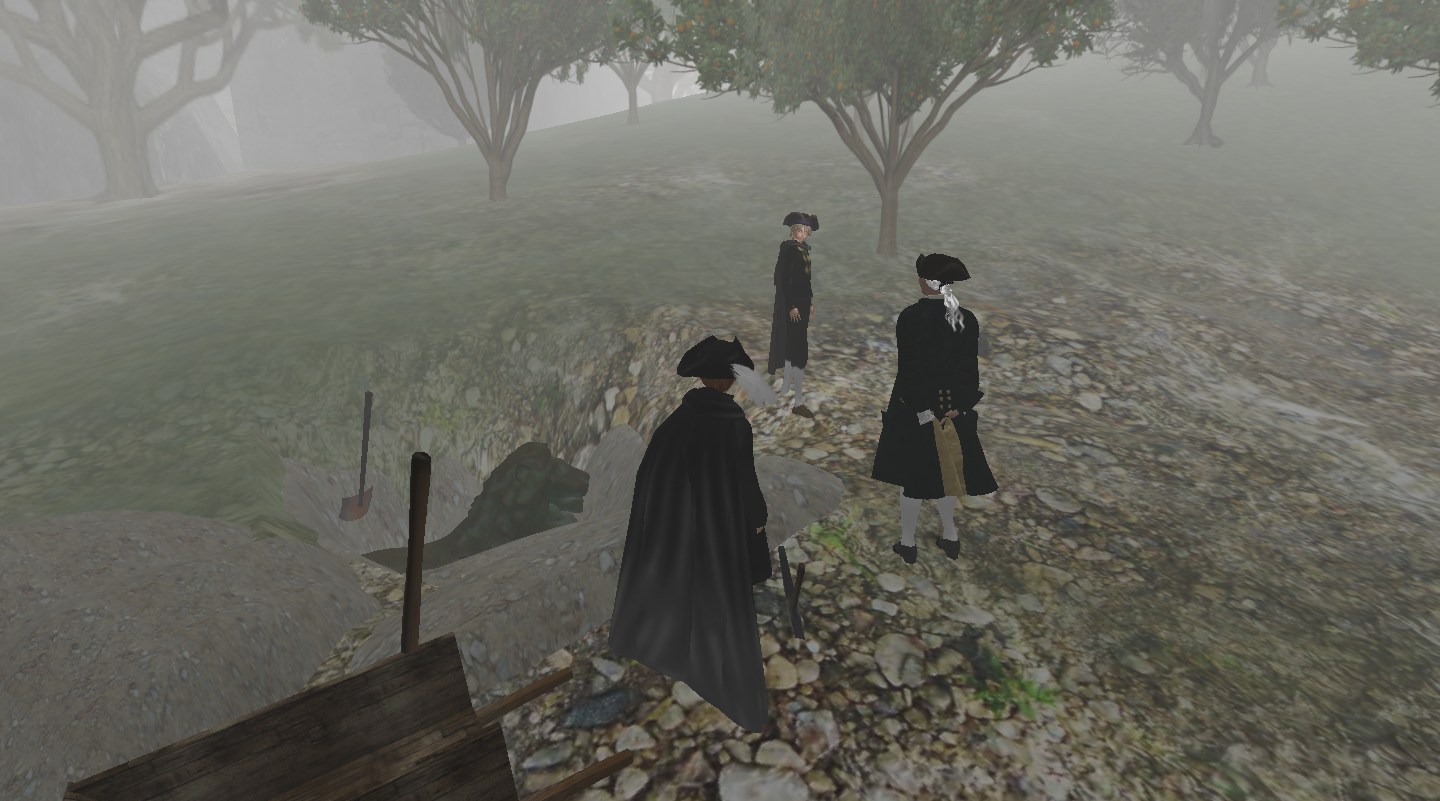 It is funny how you can hear better when you are in a mist. Professor Aldo Stern was explaining the invaders of the past -- Normans, Saracens, Greeks, Albanians -- but I was distracted by the sound of rapid, determined footsteps. These reminded me of my friend Prospero Pastorelli, eldest among the apprentices. Sure enough, the older boys dark shadow appeared just on the other side of the pit.
It is funny how you can hear better when you are in a mist. Professor Aldo Stern was explaining the invaders of the past -- Normans, Saracens, Greeks, Albanians -- but I was distracted by the sound of rapid, determined footsteps. These reminded me of my friend Prospero Pastorelli, eldest among the apprentices. Sure enough, the older boys dark shadow appeared just on the other side of the pit.
Ciao, Prospero, I called.
Ciao Fiorino, he called back, and then quickly came out of the shroud of the thick mist and added: Buona sera, Signor Professore.
Salve, Prospero, the professor called back. Come closer, but watch your step. Tell me if what is in this pit reminds you of anything that you have seen before.
Prospero crouched down to look at the contents of the dug-out. Wow! What a buried treasure! he exclaimed. It looks like the lions that are by the fortress.
Yes indeed, said the professor. Those are in stone but this lion is bronze. It is very curious, dont you think, Prospero?
Curious? Yes! Fantastic, really! But why should this bronze lion be found so far from the fortress? Isnt that fortress a bit ancient, Professor?
The professor nodded. It is from the 14th Century, I suspect. This bronze lion may be of the same era. This week some of our gardeners spotted a strange protrusion, so I ordered the workmen to dig here. This is what they found. As we keep digging, I suspect we may find some clues, with the remains of a structure.
Fantastic! Prospero repeated, then he asked: Are you going to close off this part of the land, Professor? When people see this they might just want to start digging all over.
Yes. We must be careful now. In fact, I am going to meet with the regency council now. However, I think you will both agree that this is an exciting discovery.
Yes, Professor, Prospero and I answered at the same time.
Take care, boys. I must hurry to the council meeting. I hope to see you tomorrow, the professor said, hurrying up the hill.
The professor said tomorrow, but we had told the professor and the baroness that we would be leaving tomorrow.
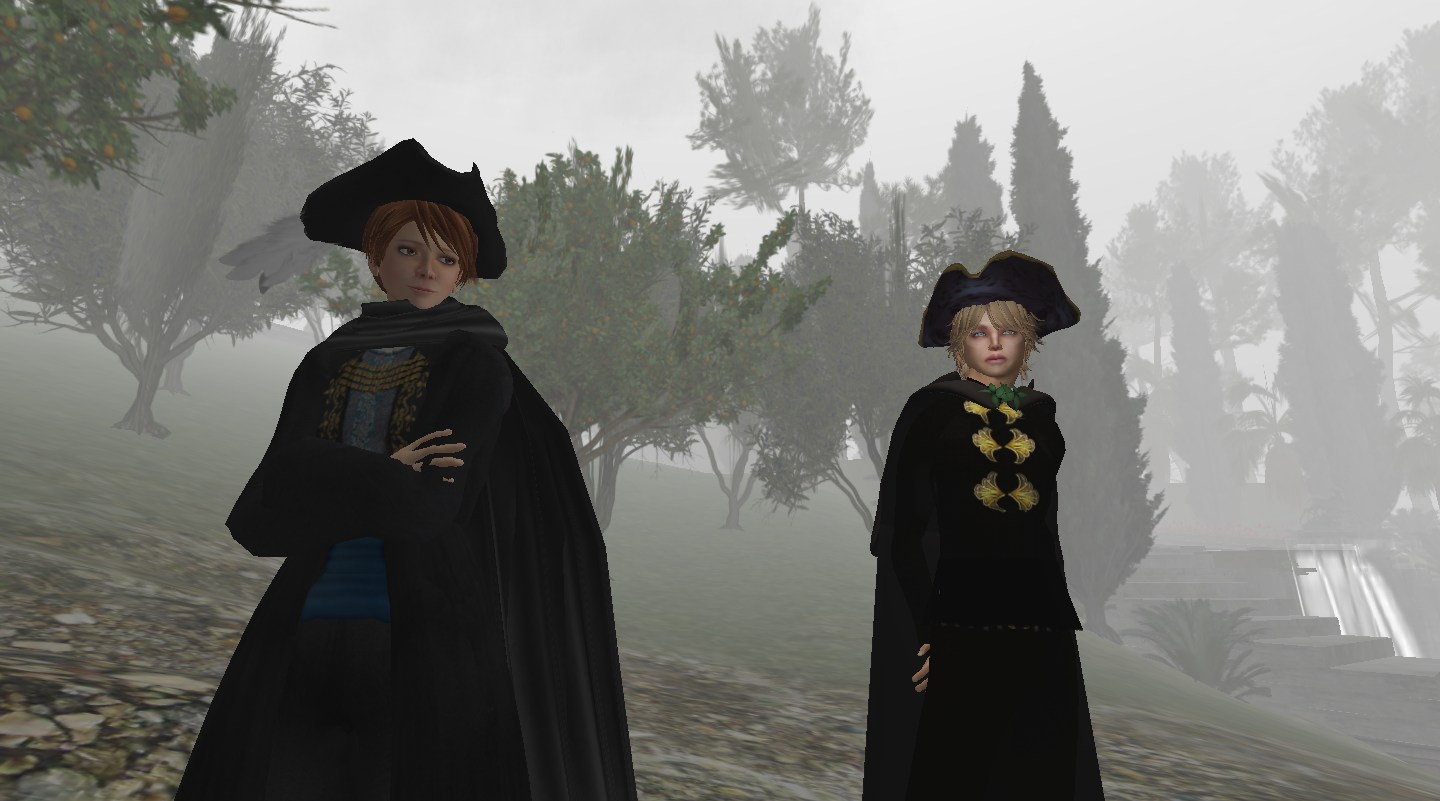
Maybe he forgot, Prospero said, reading my thoughts. I looked around to see if anyone was nearby, but the fog was too thick. I did not want to be overheard as I told Prospero about the captain of the Aurelia and his demand that I meet him at sunrise and serve as his cabin boy.
If that is the case, Fiorino, then we shall leave before dawn. If you join his crew, youll never get home. Besides, Rico has enough money now that we can fend for ourselves.
Right, I said.
We just have to stick together. The old woman who sells the herbs told me that if we stick together, Fortune will find us.
Somehow she scares me as much as the sea captain does, Prospero, I said, and sat on the mound of dirt by the pit. Nobody has paid attention to us for months except for the Principe, and now suddenly, when he is gone, many people are starting to treat us very nicely. It seems to me like a trap. It feels dangerous to stay here and dangerous to leave.
This professor seems like someone that we could trust, Prospero said. He has in mind to get the baker to expand production so as to sell supplies to the ships that come into port, especially the crews. I can see making a fortune right here.
Fortune there was that word again. Prospero went on for a couple of minutes to explain the professors plans and theories. I said nothing until he finally asked me: So, what do you think, Fiorino?
I think that we really need to find a way home. Your father expects you to run the Inn for him in Parma; Ricos father expects him to become an excellent typographer and to set up a print shop in Padua. Neither of you can stay here much longer. And I miss Don Angelo and Monsignor the Patriarch, who have cared for me since I was small. I want to return to San Pietro in Castello and finish my apprenticeship.
Prospero listened quietly and then said: Yes, you are right. We need to go home. Tomorrow we leave, before dawn, so that no one will stop us.
***
There was one more person that I needed to see, and that was the Earl of Essex. Prospero had given me all I needed to respond to the Captain of the Aurelia, but Essex had been a friend lately, and I wanted to say goodbye properly.
Did you tell the sea captain that you would join him? the Earl of Essex asked me after I recounted meeting the Captain of the Aurelia.
No, Excellency, I refused him twice.
Good. You did the right thing. Never entertain a dubious proposal, Fiorino. Even a hint at agreement can trap you for life. It is how this breed operates. They offer to do you a favor in exchange for a favor. If you accept, they will hold you to do them favors forever. If ever you refuse after that, they will kill you. Now you had better hurry back to the villa. It is getting too dark and there are many unsavory characters stalking the port lately.
Essex put his hand on my shoulder has he opened the door for me -- something that the Earl had never done before. He sounded very concerned when he gave me leave: Be safe, Fiorino, he said.
As I left the Earls house, the church bells rang. Did they toll a warning or an invitation?
Fiorino hears the church bells as darkness falls
[PS: A treasure hunt will take place at Melioria this weekend. Be sure to visit and see what you can find!!!]
Well I had an eventful day in the big city and saw many things and lots of fun.
But I still couldnt escape the 18th century... :P But its kind of hard to do in a city with so much history and old buildings.
Gtheborgis a sailing replica of an 18th century Swedish East Indiaman, a wooden sailing vessel. The original sank off Gothenburg, Sweden on 12 September 1745 while approaching its home harbour after returning from her third voyage to China. All sailors survived, but the ship was lost.
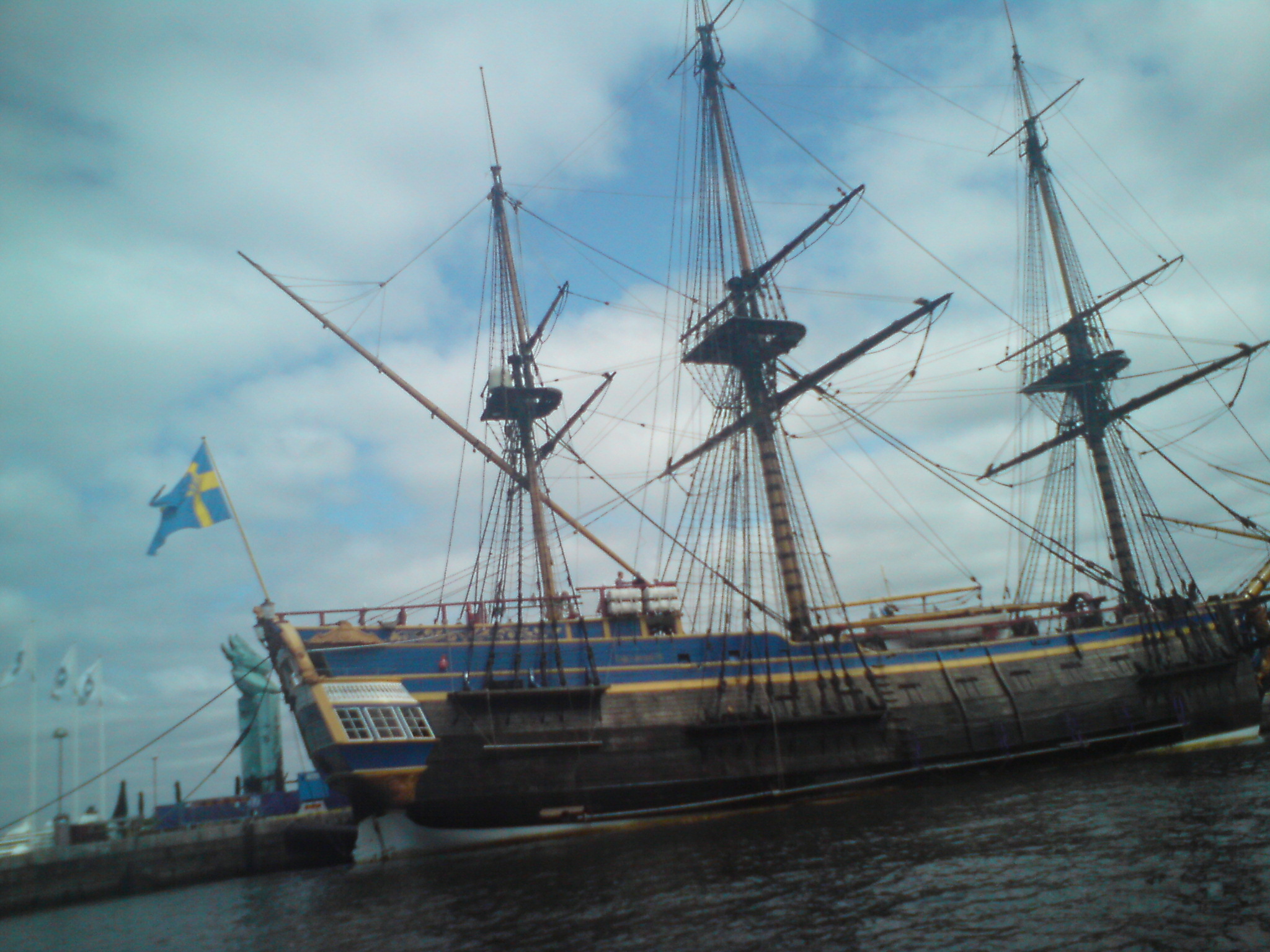
The wreckage was found in 1984 and ideas about building a replica got started.In 1995 the keel was finished,and the whole ship was completed in 2005.
The cost for buildingit all? - $30 million
It even went to China...
The voyage took about one and a half years.
The route to China followed approximately the 18th century original route, with the added detour to Australia (although in the 18th century, they usually avoided ports to avoid pirates). The journey home took the shortcut through the Suez Canal while they during the 18th century had to go back around South Africa.
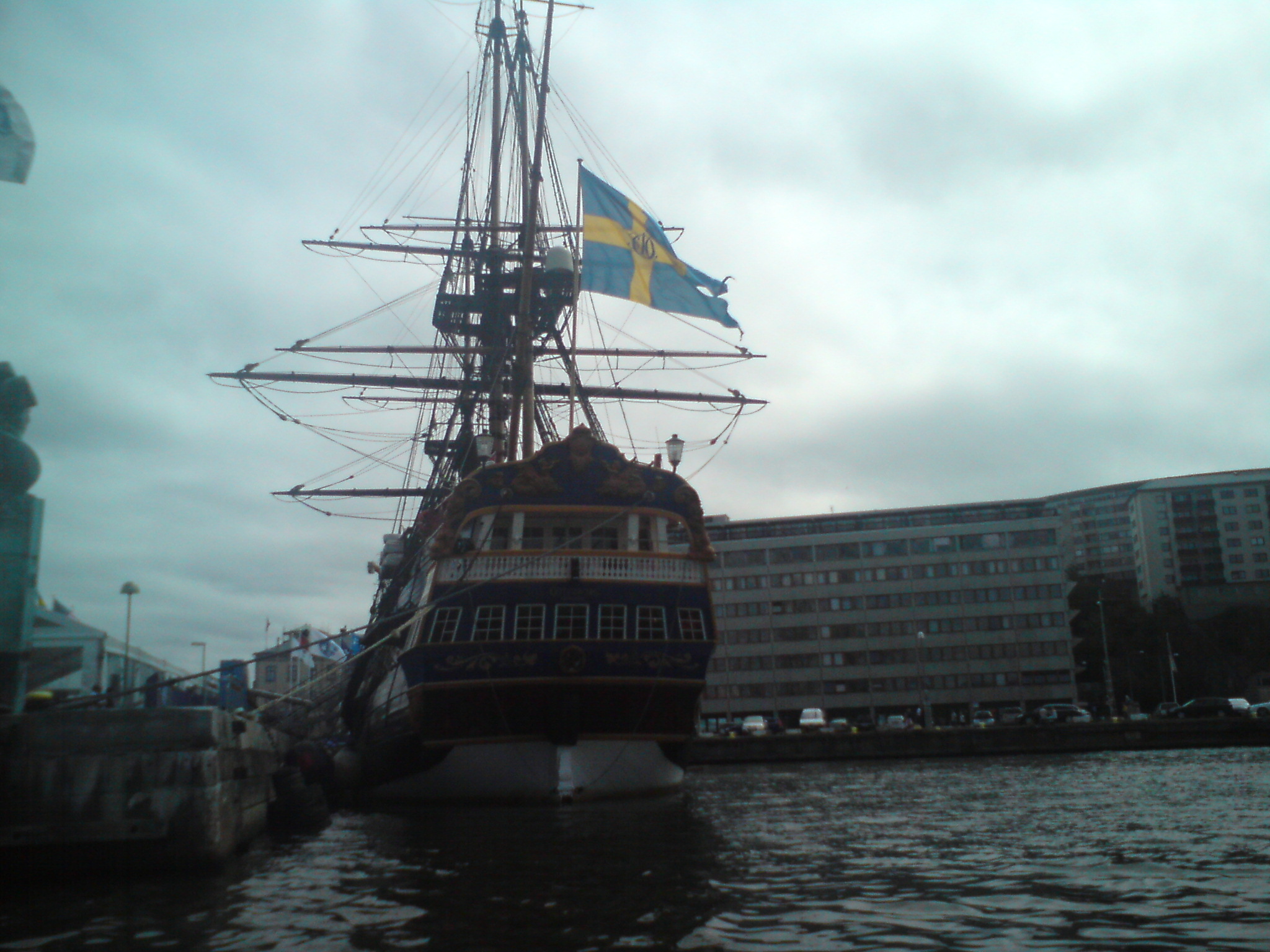

The Swedish East India Company was established 14 June 1731, its purpose to trade in East Asia. The company followed the Portuguese, the Dutch, the Danish, the French and the English East India Companies. The company got a 15 year monopoly on the trade, and the goods exchanged were Swedish timber, tar, iron and copper against tea, porcelain and silk. The company was situated in Gothenburg.
The building can be seen in the photo The text says roughly "Built in 1750 by the East India Company" The company went bankrupt in 1813.
The text says roughly "Built in 1750 by the East India Company" The company went bankrupt in 1813.
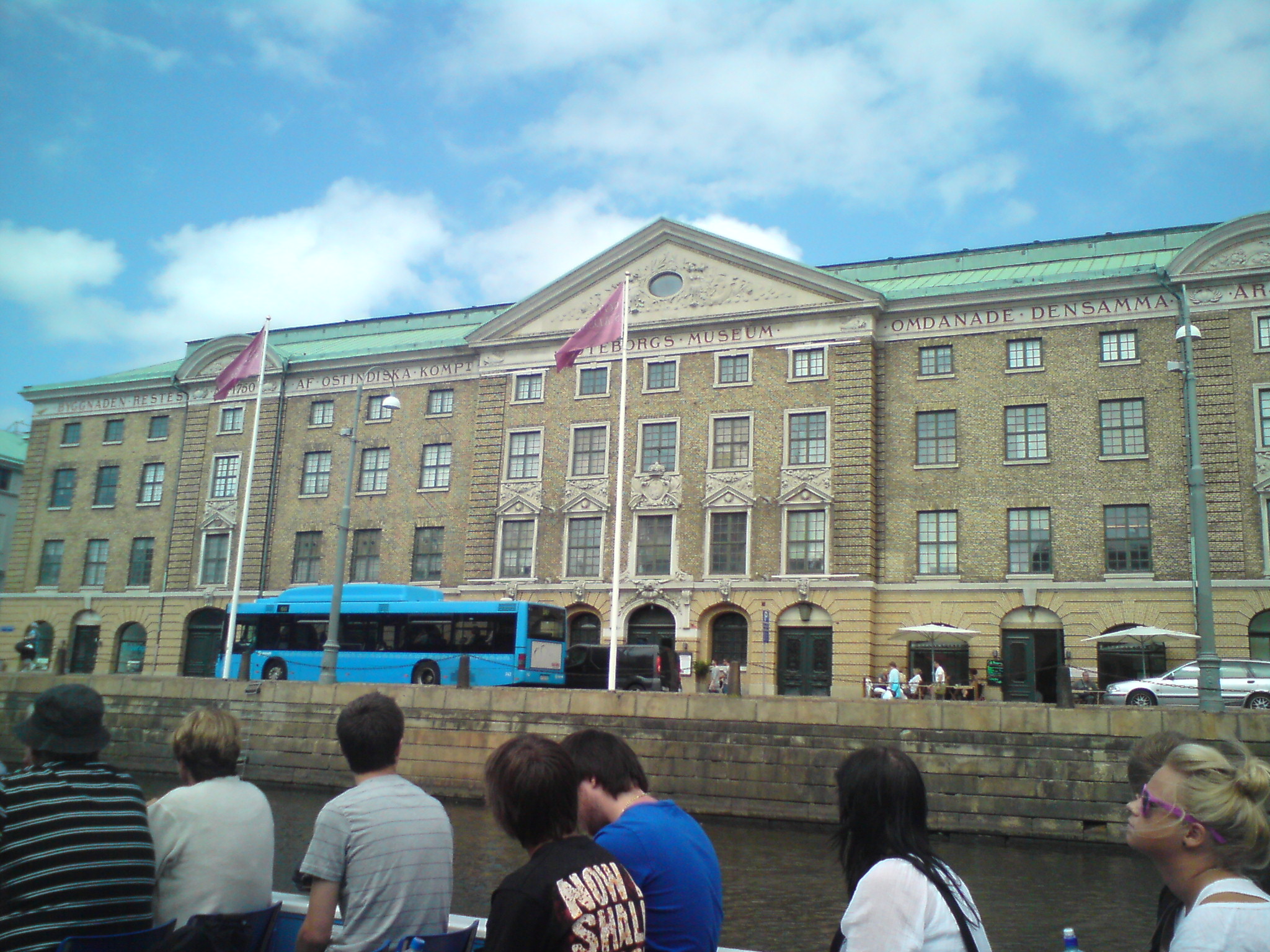
I had wanted to visit the art museum to see its Roslin and other art,but the weather was so nice that it felt a waste to spend it indoors. Oh well maybe next time.
The adventures of Orlando furioso kept me excited all through dinner. Just as we said the final prayer and were about to leave, a tall stranger blocked the exit of the boys dining room. I need the apprentice Fiorino, he announced, and I immediately responded: At your service, Signore.
The stranger identified himself as Captain Kungler of the Aurelia, and spoke without ceremony. Ive come to Melioria with a shipment of beaver pelts. Tomorrow we ship out. I am in need of a cabin boy. I am told that you know the sea and how to sail.
Signor Capitano, I must decline, I said respectfully, An apprentice gondolier like me knows the canals of Venice but does not know the sea.
Not important. Cabin boys have other responsibilities and answer only to the Captain. You will learn to be a seaman, he smiled, and relit his pipe.
The captains smile did not reach his eyes, which made me very uneasy.
Signor Capitano, without my patrons permission I must refuse your generous offer, I answered, in the most polite of tones.
The Prince of Melioria is lost at Sea. You need a new patron, and that would be me. I expect you to accept my offer and to be at the docks at sunrise. The captain took another puff. Make yourself ready, he added, then turned and strode out of the room.
My heart was pounding. Who told the captain about me? Who told him I should go to sea with the Aurelia? I grabbed my cloak and raced down to the southeast shore where the Earl of Essex had his summer cottage. Ever since the Prince of Melioria had gone on his journey, Essex had shown me great kindness. I needed to see him now!
A shocking disorder greeted me just before reaching the cottages: an enormous pit, surrounded by tools, shovels and carts. Who was digging? When I got closer, I observed a bronze lion wedged at the bottom of the pit.
What could this mean? Why would anyone bury such a beautiful sculpture? I got as close as I could, but I did not dare go into the hole. It was a good thing too, because I was startled by a voice that came from behind. You see the lion, Fiorino? Does it remind you of anything?
I nearly fell in the hole out of surprise! As soon as I caught my balance I realized that it was Professor Stern who stood behind me. Does that lion look familiar?
It reminds me of San Marco, I said: the lion of St Mark, who protects Venezia.
The professor from Turin smiled and shook his head. Oh no, I do not believe this has anything to do with Venezia. Look again, and see if it reminds you of any other lion.
Taking a different position, I studied the magnificent sculpture. It was certainly very familiar to me. Many cultures used the lion as their primary symbol, the professor explained, In fact, we know many invaders came through this area, from the Normans to the Saracens, not to mention Pirates. This may indicate that the Normans built a settlement here centuries ago.
The lion was magnificent. But why would anybody bury this lion here? I asked.
Who says anyone intended to bury it? the professor countered. Perhaps there was a disaster and this area was abandoned. If we keep digging, we may find more interesting ruins. Melioria is richer in mystery and history than we imagine.
As the professor spoke, a heavy mist rolled in from the sea, and I pulled my cloak more tightly around me. The professor began to hum a tune that I recognized as La fiera dellest , a ballad that tells how one thing builds on another. I looked at the professor and then stole a look at the lion. The professor was smiling and quite happy; the lion was dark and solemn, as if to say that he had some mysteries to reveal.
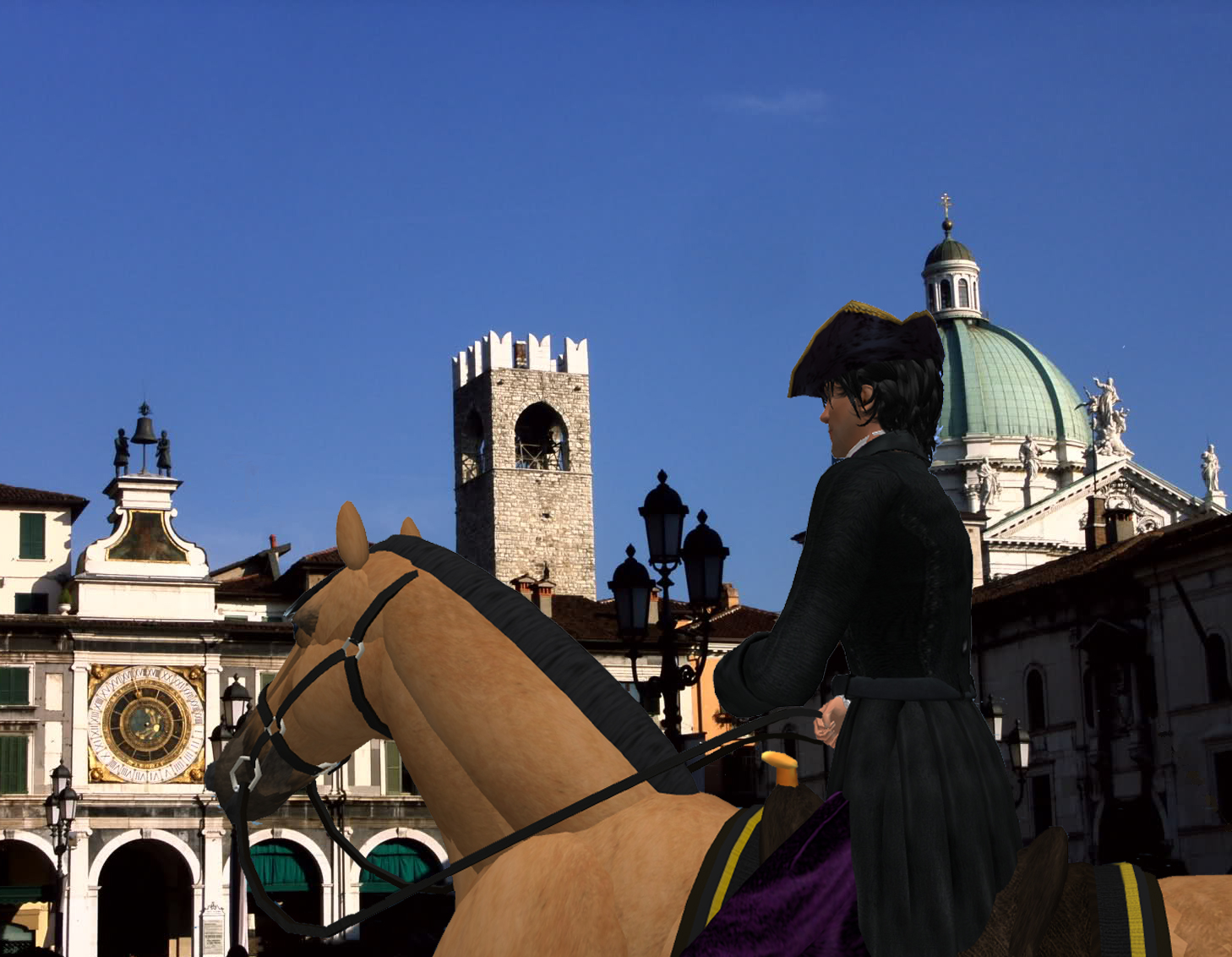
I manage to reach Brescia by late morning, and, in the bright sunshine, I make my way to Piazza della Loggia.
I have been to Brescia before on business for the Conte, so I know it quite well. It is said that its an old town dating back to Roman times and was then known as Brixia.
I always enjoy coming to this square, and looking at the clock with the two Moors. It reminds me of the one back home in San Marcos square. The story goes that both clocks were made by the same artisan, who made the one in Brescia first, and was then commissioned to make the one in Venice. When he had completed the clock in San Marcos square, the Doge had him blinded so that he would never make another. I dont know if there is any truth in this, it may just be a story.
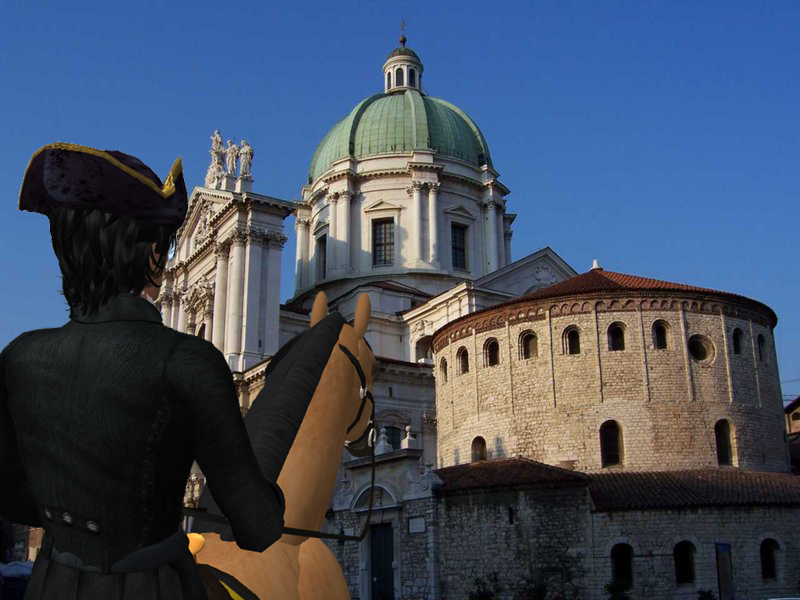
I quickly make my way through the back streets to Piazza del Duomo. Its called Duomo because of the two domed buildings standing next to each other. They started building the Cathedral at the beginning of the 17 th century, and they still havent finished it. The church next to the Cathedral is much older. 11 th century I think. It is Romanesque in architecture, sometimes called the Rotonda. I always think its looks so strange that the older Church is at a much lower level than the Cathedral and square.
I want to deliver the letters as quickly as possible to the Vescovo, so I go round the back of the Cathedral where he has his private rooms.
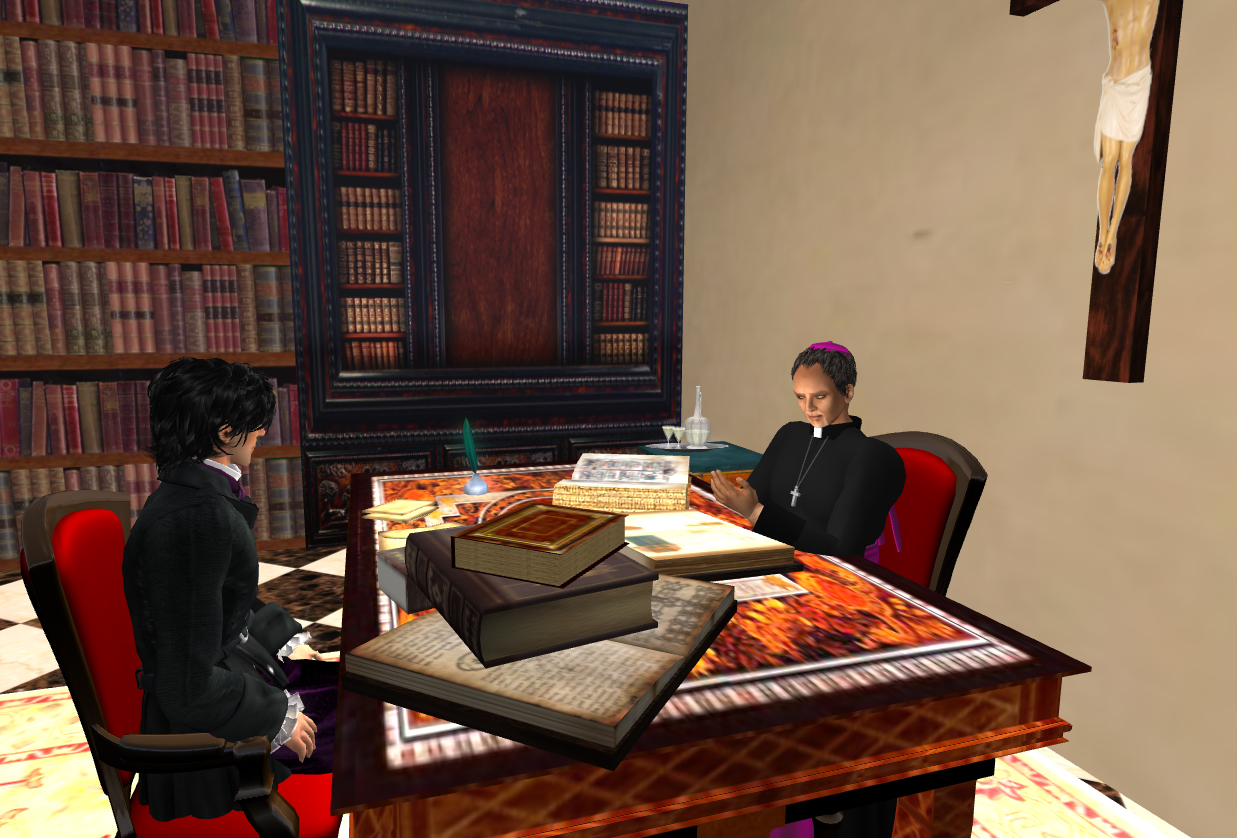
I really just expected to leave the letters with the secretary of the Vescovo, so imagine my surprise when I am ushered into the presence of Giovanni Nani, Vescovo of Brescia. He very kindly asks me to sit down, and explains how pleased he is to meet a fellow Venetian. I give him the letters and he asks me if I am returning to Torbiato. I explain that I am on my way to Melioria with other letters. Ahh he says, be careful he says, once you leave the Veneto there is very little law and order. The south is filled with Bandits and Wolves. Which route are you planning on taking? He asks.
I tell him of my plans, and he gives me a map and good advice on the best route, for which I amextremelygrateful. I confess that I had very little idea where I was going.
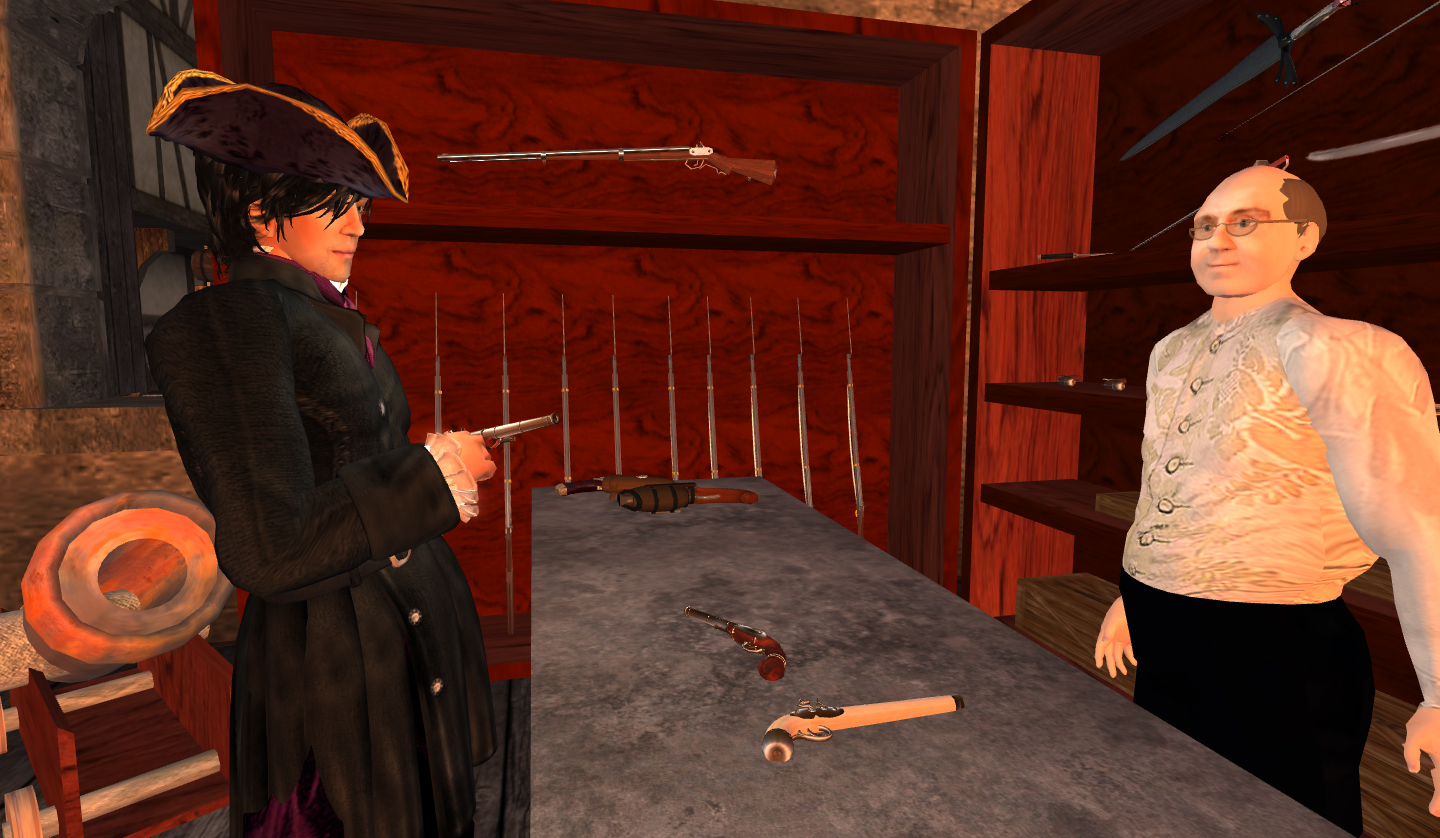
Having accomplished my immediate Mission here, I am free to go shopping and after the Vescovos warnings about the possible dangers of my journey, I have decided to use some of the gold to buy myself a good Flintlock Pistol, in case I have to defend myself against either Wolves or Bandits.
The Hills in nearby Gardone Valtrompia are rich in Iron Ore and they have been making weapons here since Roman times. So Brescia is well known for its gun manufacturers, especially those made by the Beretta Family.
Sure enough under the Porticci I find the Family shop, and am greeted by Signor Giovanni Beretta who helps me to choose a suitable weapon.
He seems a very jovial Man, and when he hears that I am Venetian he launches into the tale of his illustrious ancestor Bartolomeo Beretta who in 1526 was paid 296 Ducats for making 185 Arquebus Barrels for the Arsenale of Venice, thereby starting the Family business.
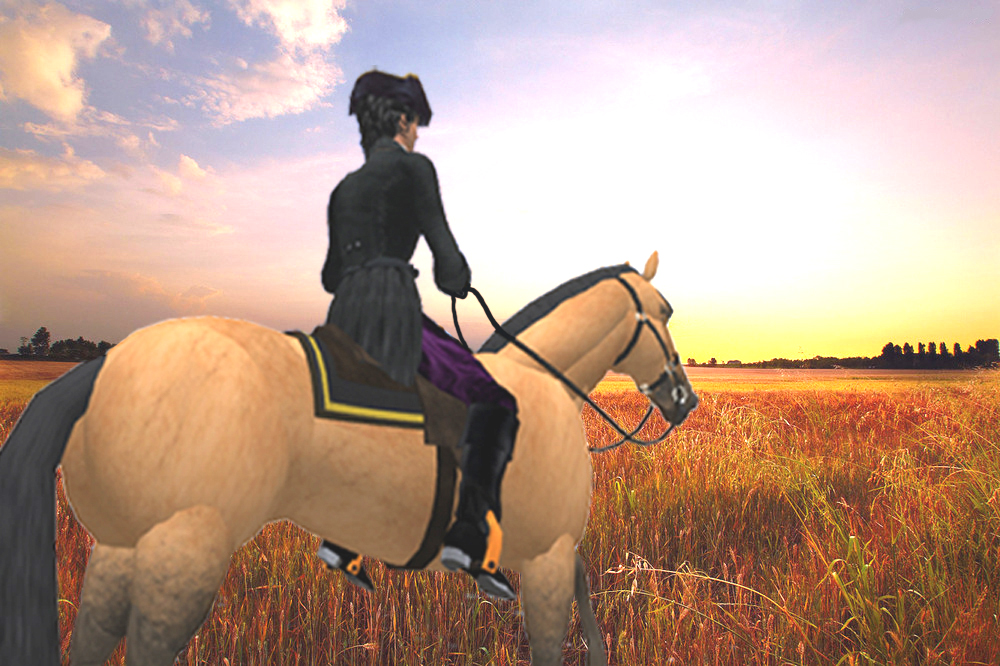
I choose a simple gun, with a tiny bit of Inglesina engraving, but a very reasonable price, and having paid I hurry out of Brescia and back onto the road. If all goes well I may get to Mantova by nightfall.
~~~
Professore Aldo Stern sat gazing out the large, arched window towards the impossibly blue sea, his long fingers curled around the warmth of what was undoubtedly just the first of many cups of coffee he was going to go through in the course of his day. Yes, it was just the first, but that initial serving of thick, rich brew was always the best.
As he took another sip, his mind briefly flickered back to his musty classroom at the University in Torino.
He had been in Melioria for only a month or so, serving as a member of the Regency Council, adminstering the island on behalf of the missing--and hopefully not deceased--Principe Eslwit. Yet already, that grim and airless lecture hall seemed like nothing more than a vague, half-remembered dream--something that had been imagined, rather than actually experienced. He grimaced slightly, wishing he could forget about that last batch of first year law students.
"Wretched clotpolls ," he thought. "If they had displayed but half the wit and a fourth of the ambition that these Melioria apprentice boys have been demonstrating, I might have considered refusing the appointment to this council."
But he knew that would have been unlikely. In fact. the students meandering in and out of his classroom for the last few years had been an unrelentingly inadequate lot. The odds would have been slim to none for this year's crop to have been any better. And to be honest, he had been entranced by Melioria since the first time he had seen it, back a number of years before, when the bankers from Brussels had brought him here to consult with the Principe on a variety of legal matters. Given the chance to return, even under these doleful circumstances, he had jumped at the opportunity.
Melioriawas simply one of the most exquisitely beautiful places he had ever seen. And in many other ways, Melioria was a remarkable place, truly remarkable. To a great extent this was a reflection of the man who had ruled the island for many years, the Principe Elswit. His influence could felt in so many places on Melioria: the common usage of the english language on the island; the unique and numerous water features with fountains and decorative spillways; the flourishing experimental vineyards and olive groves; even the bizaare house numbering system that probably made sense to him (a scecret code, perhaps?), but which slightly baffled everyone else.
But to Professore Stern, what made the island particularly delightful was the unexpectedly eclectic collection ofpeople who found their way here...
For example, one had only to look at the members of the council to see fascinating and unexpected diversity. His fellow councilorswere such intriguing characters: the mysterious Sir Geoffrey, the English banker who spoke very little of banking, but could go on for hours about architecture; the Principe's sister, Donna Ariella, who had been raised in a convent much of her life, yet was possibly one of the most cheerfully clear-headed and pragmatic thinkers he had ever met; and that odd German Baronessa, with her ever-present pipe clamped in her teeth and her atrocious Italian, speaking more knowledgeably of military tactics and strategy than your average french general.
Then there were the fascinating visitors coming in through the harbor, such as Captain Kungler of the brig Aurelia-- the man was affable, intelligent...and utterly unscrupulous. How did he manage to smuggle to Italy a cargo that contained both illegal beaver belts from the loyal British colonies of Canada, AND tobacco from the rebellious colony of Virginia? How had he gotten away from American privateers, the British Royal Navy, the French navy, AND made it past the Barbary corsairs?
Speaking of the Barbary corsairs, there was that visit from an Ottoman pasha, who turned out to be a well-born englishman who had simply decided he preferred life among the muslim princes and pirates of North Africa. His entourage had included a desert Sheikh, a warrior-prince of the Bedawi--who Professore Stern had found himself getting along quite well with. Who would have thought?
And then there were those apprentices: especially witty, well-read Prospero, the baker's apprentice who was reading the latest works of the tragedian, Alfieri; and studious Fiorino, the apprentice gondolier who was fluent in Greek and Latin...
Why couldn't his students in Torino be more like those boys? Fio and Prospero and Rico, they positively hungered for knowledge; they burned with a desire to learn and to construct lives for themselves that would be better than what chance would have otherwise sent their way.
" No, " the professore mused, " this is an experience--these are people--I would not have missed for the world. "
He thought more about the apprentices. He wished they weren't so fixed in their determination to leave. And it wasn't simply that he would miss their conversation, their eager and earnest discussion of topics ranging from modern Italian literature to ancient artifacts. No...he also felt a vague sense of unease. Something wasn't quite right. It didn't help that the Baronessa kept muttering about things being awry and of lurking dangers...
Captain Kungler had recently offered the Profesore a set of good english pistols. He had turned the offer down, thinking it was not something he required at this point in his life. It had been many, many years since he had handled a firelock.
Reflecting on things now, Professore Aldo Stern decided that he would see if the Captain still had those pistols available...
There was no time to waste. Prospero told us wed leave the next morning, and there were borrowed items to return, people to greet one last time. I was feeling a little odd after what Prospero and Rico had to say, but maybe they felt odd about what I had told them. For now I had to but that out of my head: there was too much to do.
As soon as I got to the port I met the Baroness von Khr. She was strolling up and down the promenade with a small book in hand. I told her that we had found passage to the mainland and would be leaving. I do hope it is not permanent, she said. You know you have a place here.
Just then Professor Aldo Stern arrived. He is a professor in Torino. I thought that he came to Melioria on holidays, as so many people do, but no! He is on the regency council. I am sorry that you are going, my boy, he said. I have been quite impressed that you are a student as well as an apprentice. I was hoping to encourage you to study philosophy now that I see that you have studied Latin.
Thank you, Professor. Don Angelo had taught me Latin when so that I could serve the mass of the Patriarch when I was at Venice, and the Prince of Melioria has always kindly lent me some of his books and pushed me to study. It is their merit, not mine.
Since you are leaving, the professor said, I do hope you will return the princes books. I would hate to think they were lost at sea or stolen by smugglers.
Very good, Signor Professore, I bowed. I will return all the books within the hour.
The baroness spoke up: And what will you read when you go to the mainland, Fiorino?
Perhaps my face betrayed my own confusion, for I had not thought about reading. My only desire was to get home.
Listen, then, the baroness said. I am reading this little book of Meditations by Marcus Aurelius. You would like it, I think. May I give you the book as gift?
Oh please no, Signora Baronessa, that is too kind, I responded quickly. It is not right that I accept it for we must travel very lightly and I do not know what we may have to do. But I cherish your offer, Signora, and I thank you.
The two nobles of the regency council gave me their leave, and I continued through the waterfront, greeting the shop keepers I knew and bidding them farewell. Keeping the Professors admonishments in mind, I returned to the Villa to bring back the Princes books to the library. Actually, I only still had one book at my place: Orlando furioso .
Orlando furioso is such an exciting book! Even if I found it hard to understand this epic by Ariosto when I first started reading, the story had me spellbound. I loved how Orlando traveled around the world to free the captives and to bring justice to the poor. This book had become my favorite and I was sorry to let it go. Yet, the professor was right. I must return the princes book to its place.
When I got to the library, I was surprised to see so many books on the floor, some opened, some closed with papers to mark the page where someone had been reading. I was about to put the copy of Orlando furioso back in its place on the shelf, but the confusion of books of the floor, and the smell of the musty pages inspired me to open Orlando furioso again and continue reading for a few minutes.
In no time I was following Orlando across fields and rivers and planes and mountains by the light of the volcano. A few minutes turned into hours, and suddenly it was time to eat.
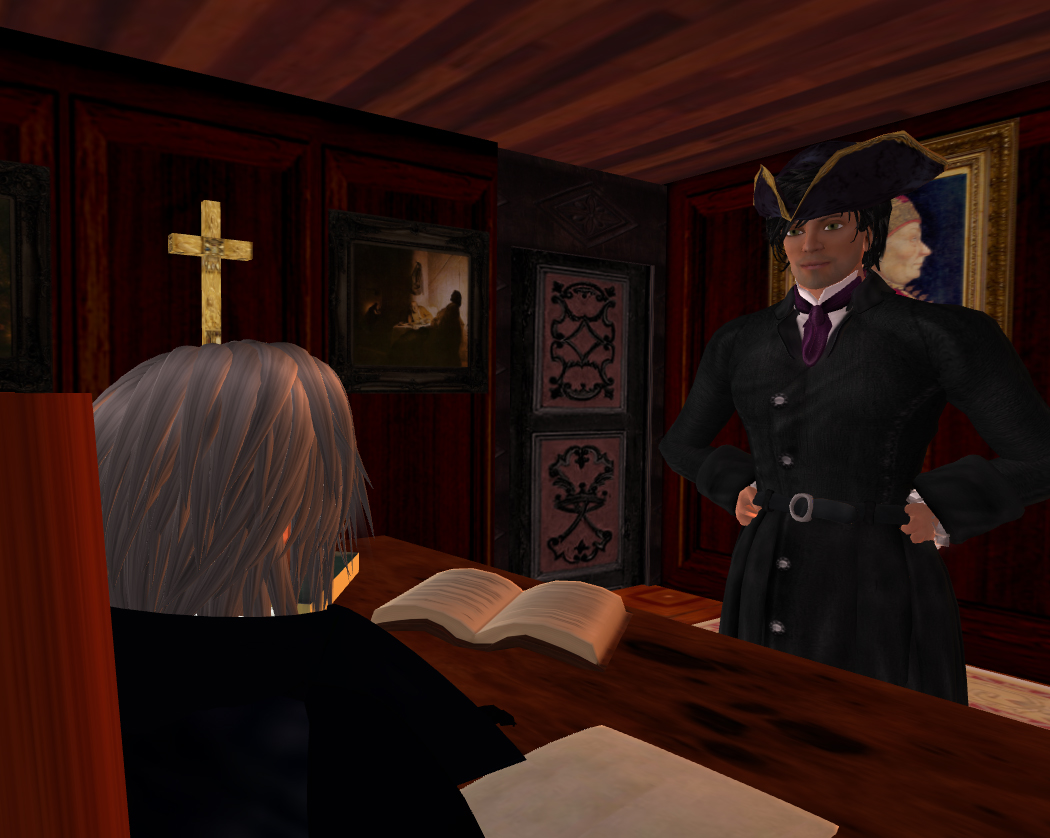
It was Late last night when the Conte Foscari called me into his study.
The Conte told me that he had a mission for me. This is not unusual. I have been part of the Foscari Household since I was a boy, and in these past few years he has often sent me on Missions. Usually he wants me to carry letters for him. So I was not surprised when he handed me some sealed letters but I was surprised when he gave me a Purse of gold for my expenses, and told me he wanted me to take the letters to an Island called Melioria all the way to the south in the bay of Salerno.
I kept a straight face, but was jumping with excitement inside. Im born and bred in Venice, and although I have travelled around the Veneto I have never been further then the lake of Iseo.
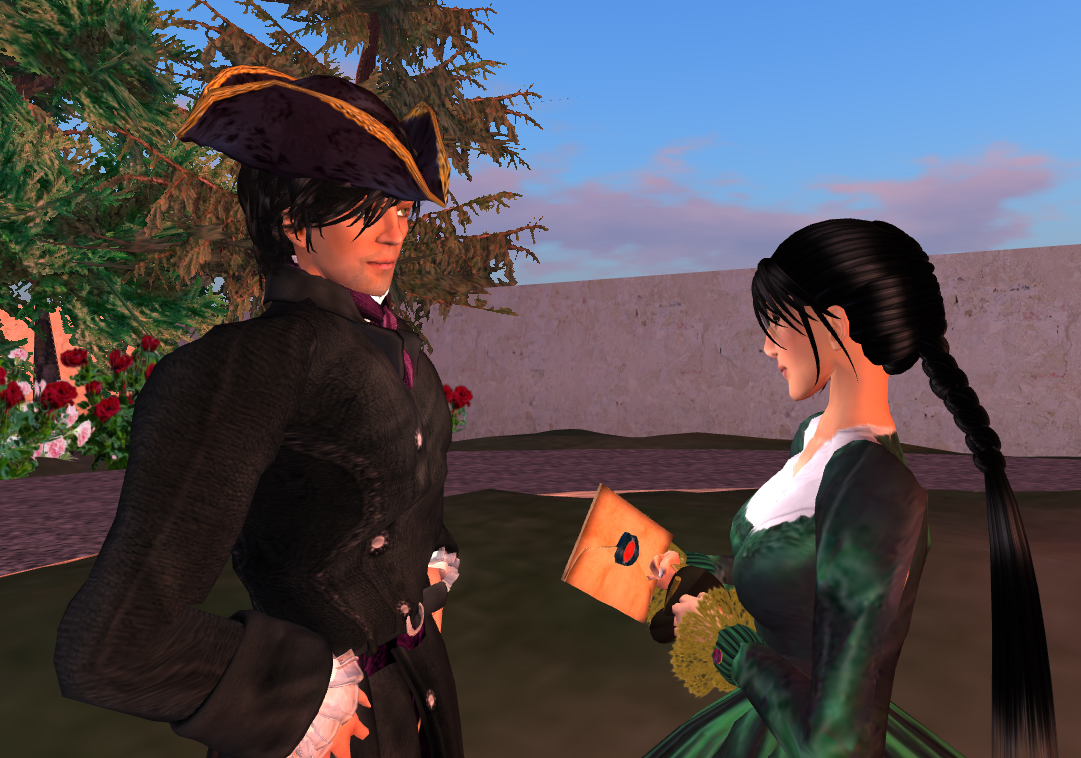
I decide to set off a dawn. The Sun was just beginning to rise, but there she was, the young Contessa, with letters in her hand, another purse of gold, and a Mission of her own for me to fulfil.
Please deliver these letters to the Monsignore Giovanni Nani, The Vescovo of Brescia. He will know what to do.
These Letters are for the Princepesa Artemisia di Elswit
Finally when you get to Melioria, I want you to find the Orphan boys I left under the protector ship of the Principe. I want you to make sure that they are either settled in permanent apprenticeships, or if not, I want you to bring them back to the Veneto safe and sound, so that their futures can be looked to here. She looks at me, Please dont fail me Zuanne.

I mount my horse and with a last look at the peaceful countryside of Torbiato, I set of on my journey.

My first stop will be the town of Brescia. I hope to be there by lunch time.
The Balloon race on Saturday was a sight to see and as I understand it the contestants had a lot of fun! It was also rather amusing to see our stalwart aviators contend for the flags and sail off to their next destinations. Our Winners were the team of MariaAdelaide and ElisabethPhilippineMarie Monpenier who sailed in to the finish at Falcon Garde Castle well ahead of the other contenders. Congratulations! I was so enthralled I forgot to take but one picture and alas I can't get it to upload tonight. I'll try again tomorrow!
Skye, Duchesse du Coeur

